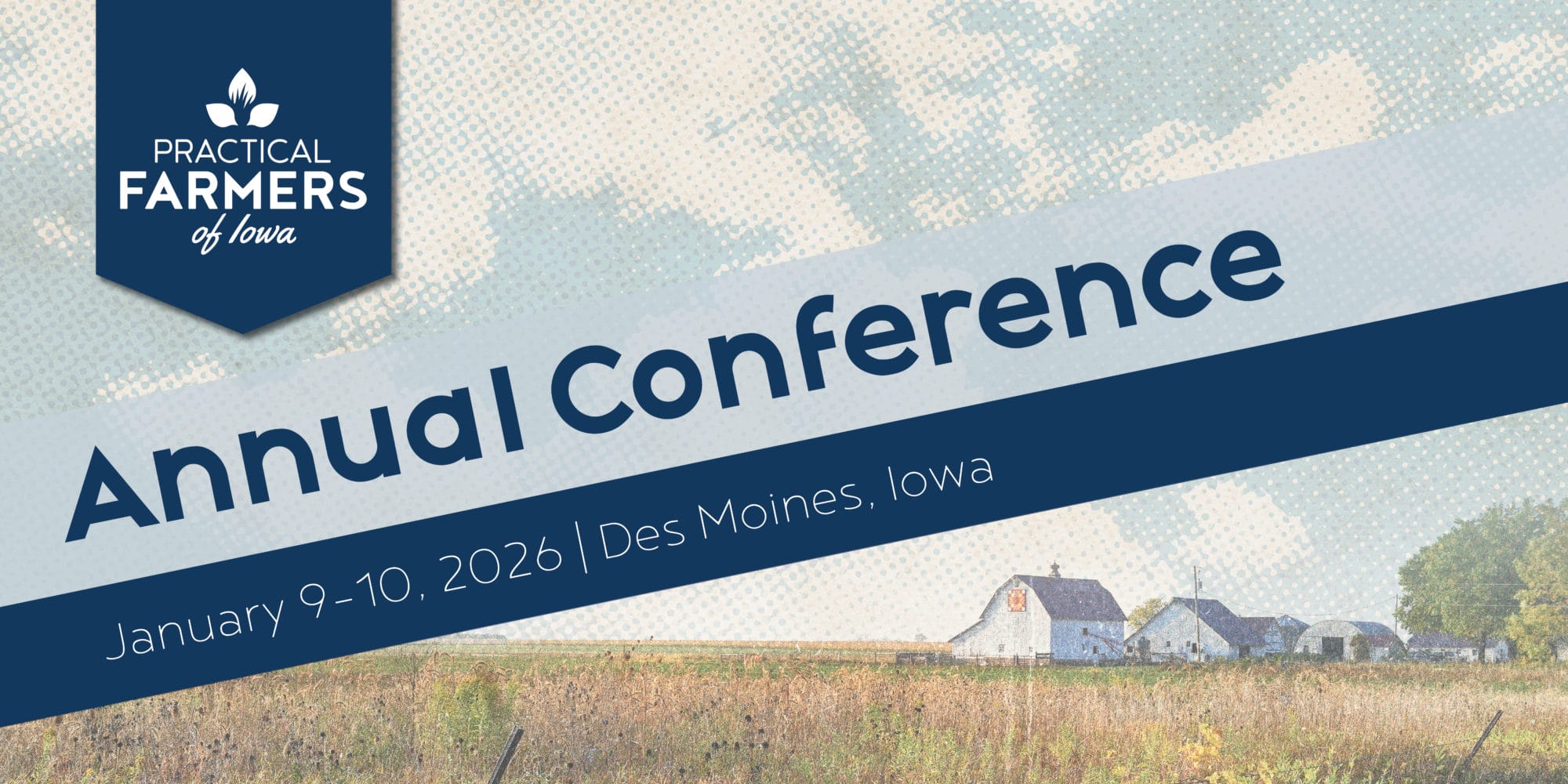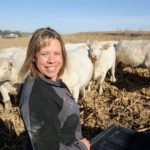Schedule
Thursday, Jan. 8
- 9-10 a.m. | Short Courses Check-in
- 10 a.m.-12:30 p.m. | Short Courses
- 12:30-1:30 p.m | Lunch (Short Course attendees only)
- 1:30-5:15 p.m. | Short Courses
Friday, Jan. 9
- 9 a.m. | Conference Registration Opens
- 10-11 a.m. | Concurrent Session 1
- 11:15 a.m.-12:15 p.m | Concurrent Session 2
- 12:15-1:30 p.m. | Lunch & Exhibit Hall
- 1:30-2:30 p.m. | Concurrent Session 3
- 3-4 p.m. | Concurrent Session 4
- 4:15-5:15 p.m. | Storytelling
- 5:15-6 p.m. | Cocktail Hour
- 5-9 p.m. | PFI Supper (Buffet will close around 7 p.m.)
Saturday, Jan. 10
- 7:30-8:30 a.m. | Breakfast sponsored by Niman Ranch, Affinity Groups & Exhibit Hall
- 8:15-9:15 a.m. | PFI Business Meeting & Award Presentation
- 9:30-10:30 a.m. | Concurrent Session 1
- 11 a.m.-Noon | Concurrent Session 2
- Noon-1:15 p.m. | Lunch & Exhibit Hall
- 1:15-2:15 p.m. | Keynote Address
- 2:45-3:45 p.m. | Concurrent Session 3
- 4-5 p.m. | Concurrent Session 4
Annual Conference Breakout Sessions & Speakers
Friday Session 1: 10-11 a.m.
Meet-and-Greet at the PFI Conference
Whether it’s your first time at the conference or you’re a long-time attendee, it can be hard to strike up conversations with new people. In this “non-session,” we’ll spend the time passing the mic around the room so people can introduce themselves and then continue visiting as time allows. Don’t be a stranger!
Growing and Selling Ginger and Turmeric
Nicki Morgan
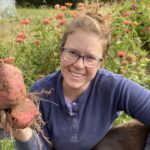 Nicki Morgan owned HartBeet Farm, a diversified vegetable operation in Missouri, for eight years. After a brief sabbatical, Nicki and their wife, Katie, are transitioning to perennial agroforestry with their new farm, HartWood, located in Riverside, Iowa. While embracing the title “Recovering Vegetable Farmer,” Nicki still has a deep love for vegetable production as well as exchanging seeds of knowledge within the farming community.
Nicki Morgan owned HartBeet Farm, a diversified vegetable operation in Missouri, for eight years. After a brief sabbatical, Nicki and their wife, Katie, are transitioning to perennial agroforestry with their new farm, HartWood, located in Riverside, Iowa. While embracing the title “Recovering Vegetable Farmer,” Nicki still has a deep love for vegetable production as well as exchanging seeds of knowledge within the farming community.
Spice up your life! Fresh ginger and turmeric are popular ingredients for flavorful recipes and health products. Despite growing well in Midwestern high tunnels during the summer, they are still a rather uncommon crop to grow or find at farmers markets. For many seasons, Nicki raised ginger and turmeric at their farm in Missouri, and they hope to add them back to their Iowa farm soon! You’ll learn about seed-sprouting in the greenhouse, transplanting, care and maintenance throughout the season, harvesting, marketing and value-added products.
A Conversation Between Farm Store Owners
Danelle Myer and Laura Tidrick
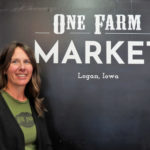 Danelle Myer is the fifth generation to farm her family’s land near Logan, Iowa. At One Farm, Danelle raises vegetables for farmers markets, pop-up farm stands, online ordering, restaurants and wholesalers in Des Moines, Iowa, and Omaha, Nebraska. In November 2020, she opened One Farm Market in downtown Logan, population 1,400, selling local food products from around the state.
Danelle Myer is the fifth generation to farm her family’s land near Logan, Iowa. At One Farm, Danelle raises vegetables for farmers markets, pop-up farm stands, online ordering, restaurants and wholesalers in Des Moines, Iowa, and Omaha, Nebraska. In November 2020, she opened One Farm Market in downtown Logan, population 1,400, selling local food products from around the state.
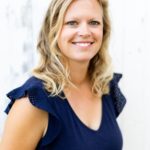 Laura Tidrick is a passionate foodie who started farming to feed her family the highest-quality food possible. Along with her husband and two daughters, she raises heritage pork and poultry using certified organic feed and pasture grazing. She sells lard- and tallow-based soaps and skincare items, along with other value-added and ready-to-eat products, through an on-farm store, website, local grocery stores and restaurants.
Laura Tidrick is a passionate foodie who started farming to feed her family the highest-quality food possible. Along with her husband and two daughters, she raises heritage pork and poultry using certified organic feed and pasture grazing. She sells lard- and tallow-based soaps and skincare items, along with other value-added and ready-to-eat products, through an on-farm store, website, local grocery stores and restaurants.
Whether stocking your own products or sourcing from others, running a farm store can feel miles away from farming. What sells and what doesn’t, and how do you adjust? What layouts work and how do products get placed? These are a few of the questions Danelle Myer and Laura Tidrick are asking each other during this interview-style session. Join us as Danelle and Laura discuss sourcing, markup and the decisions that factor into running a farm store in Iowa.
Soil Health Economics
J.D. Hollingsworth
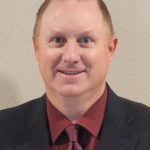 J.D. Hollingsworth started his career with the Natural Resources Conservation Service in 2008 as a soil conservation technician. In 2015, he became a civil engineering technician. Since 2020, J.D. has worked as an area soil health specialist for southeast Iowa, covering 24 counties. In this role, he helps farmers develop strategies for making soil health systems work for them and helps them analyze the soil health on their farm. He also trains NRCS staff on soil health practices and how to analyze soil health for farmers.
J.D. Hollingsworth started his career with the Natural Resources Conservation Service in 2008 as a soil conservation technician. In 2015, he became a civil engineering technician. Since 2020, J.D. has worked as an area soil health specialist for southeast Iowa, covering 24 counties. In this role, he helps farmers develop strategies for making soil health systems work for them and helps them analyze the soil health on their farm. He also trains NRCS staff on soil health practices and how to analyze soil health for farmers.
No-till farming methods and planting cover crops are two practices that improve soil health. Initially, they might lead to a higher input cost – but they can have long-term economic advantages. Soil health specialist J.D. Hollingsworth will discuss ways soil health can improve the bottom line in your farming operation. J.D. is also a fourth-generation farmer who farms with his dad in southeast Iowa.
Economic Considerations for Diversifying Crop Rotations on Organic Farms
Wesley Rieth
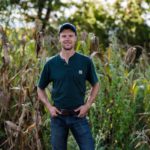 Wesley Rieth is the farm manager for LongView Farms, a row-crop grain operation in central Iowa that specializes in seed corn, commercial corn and soybean production using a range of conservation practices. Wesley previously managed the row crop operations at Granor Farm, a multienterprise diversified organic farm in southwest Michigan.
Wesley Rieth is the farm manager for LongView Farms, a row-crop grain operation in central Iowa that specializes in seed corn, commercial corn and soybean production using a range of conservation practices. Wesley previously managed the row crop operations at Granor Farm, a multienterprise diversified organic farm in southwest Michigan.
Balancing market opportunities and healthy rotations is a common challenge for organic row crop farmers. Wesley Rieth offers a farmer-forward perspective on managing the risk (and potential reward) of incorporating food-grade grains into your farm’s rotations. Come dive into how crop production budgets, cost of production and whole-farm economics influence a crop plan that contains a diverse array of crops and breaks weed, pest and disease cycles.
Farming for Quality of Life
Ben Grimes
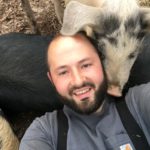 Farmer Ben Grimes of North Carolina has been in the pastured poultry business since 2013 on his farm, Dawnbreaker Farms. Since then, he has raised, processed and sold 50,000 birds through retail and wholesale channels. In 2020 he started Carolina Pastures, a collective of local pasture-based meat farmers, to scale and aggregate products to make a larger impact on the food system.
Farmer Ben Grimes of North Carolina has been in the pastured poultry business since 2013 on his farm, Dawnbreaker Farms. Since then, he has raised, processed and sold 50,000 birds through retail and wholesale channels. In 2020 he started Carolina Pastures, a collective of local pasture-based meat farmers, to scale and aggregate products to make a larger impact on the food system.
Farming can be exhausting and draining as well as rewarding and life-giving. It can be all of these at the same time! For the long-term sustainability of your farm life, it’s important to be practical about how you approach the work and set goals for yourself. Join Ben as he shares strategies for looking at your business as a tool to achieve the life you want, rather than an endless chore list.
Artificial Insemination, the Basics
Sara Shepherd
Sara Shepherd came back to the family farm in west-central Iowa after a career in marketing and nonprofits. Starting with four head of cattle, she has expanded to include a purebred Charolais and Angus cow-calf operation with spring and fall calving herds. Each year, she uses artificial insemination on both cows and heifers.
Join Sara Shepherd in this session to learn the basics of cattle artificial insemination. You’ll learn the benefits of using AI in your herd, along with issues you’ll need to consider. You’ll learn about cattle synchronization protocols and heat detection, semen handling, storage and maintenance, AI gun loading procedures and more. You’ll walk away with handouts, the knowledge you need to take the next steps with AI in your herd and where to learn more.
Cleaner Water Through Conservation: Quantifying Water Quality Impacts of Edge-of-Field Practices
Lee S. Tesdell
 Lee S. Tesdell is the owner of Tesdell Century Farm in Polk County, Iowa. His ancestors came to Iowa as farmers. Lee and his neighbors, the Helland brothers, work together to farm his row crop acres sustainably. Lee is retired from Minnesota State University, Mankato, where he taught courses in the technical communication program. In November 2022, Lee was elected to the Polk County Iowa Soil and Water Conservation District as a commissioner. His latest project is learning to grow and market Kernza for grain and forage.
Lee S. Tesdell is the owner of Tesdell Century Farm in Polk County, Iowa. His ancestors came to Iowa as farmers. Lee and his neighbors, the Helland brothers, work together to farm his row crop acres sustainably. Lee is retired from Minnesota State University, Mankato, where he taught courses in the technical communication program. In November 2022, Lee was elected to the Polk County Iowa Soil and Water Conservation District as a commissioner. His latest project is learning to grow and market Kernza for grain and forage.
Join Lee Tesdell, a fifth-generation Polk County farmer and Soil and Water Conservation District member, as he shares his 13-year journey to improve water quality. He has adopted no-till, cover crops, prairie strips, saturated buffers and a bioreactor. Partnering with Iowa State researchers, he tracks nitrogen removal in tile-fed water, comparing inflow and outflow at bioreactor control boxes and saturated buffer test wells. With four years of data, Lee will highlight his farm’s progress and the need to scale these practices for healthier watersheds within Polk County and beyond.
Friday Session 2: 11:15 a.m.-12:15 p.m.
Panel: Vegetable On-Farm Research With PFI’s Cooperators’ Program
Lee Matteson, Carmen Black and Jill Beebout
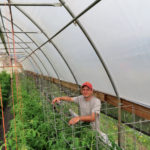 Lee Matteson grew up on a small farm in southeast Iowa, where he worked with his parents and grandparents in the summer growing fruits and vegetables. He owns and operates Lee’s Greens, LLC near Colo, Iowa, with his wife, Kelly, and four children. The farm’s main focus is off-season crops in 2 acres of heated greenhouses, and another 5 acres of outdoor production. Lee has a bachelor’s degree in horticulture from ISU.
Lee Matteson grew up on a small farm in southeast Iowa, where he worked with his parents and grandparents in the summer growing fruits and vegetables. He owns and operates Lee’s Greens, LLC near Colo, Iowa, with his wife, Kelly, and four children. The farm’s main focus is off-season crops in 2 acres of heated greenhouses, and another 5 acres of outdoor production. Lee has a bachelor’s degree in horticulture from ISU.
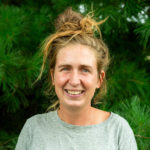 Carmen Black, with her sister, Maja, owns and operates SunDog Farm and Local Harvest CSA near Solon, Iowa. On the diversified operation they raise vegetables for 200 families and graze a small flock of sheep. They also conduct on-farm research through the Cooperators’ Program. Carmen is PFI’s current board president.
Carmen Black, with her sister, Maja, owns and operates SunDog Farm and Local Harvest CSA near Solon, Iowa. On the diversified operation they raise vegetables for 200 families and graze a small flock of sheep. They also conduct on-farm research through the Cooperators’ Program. Carmen is PFI’s current board president.
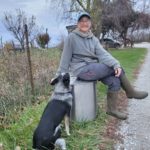 Jill Beebout runs Blue Gate Farm with her husband, Sean Skeehan. They steward 40 acres of family land in southern Marion County, Iowa, where they raise Certified Naturally Grown produce, hay and alpacas, marketing through CSA and VegEmail custom sales.
Jill Beebout runs Blue Gate Farm with her husband, Sean Skeehan. They steward 40 acres of family land in southern Marion County, Iowa, where they raise Certified Naturally Grown produce, hay and alpacas, marketing through CSA and VegEmail custom sales.
One of PFI’s core programs is farmer-led, on-farm research through our Cooperators’ Program. During this session, hear from three vegetable farmers about how participating in on-farm trials has helped them make production decisions and ask better questions. They’ll share their favorite trials, the benefits (and challenges!) of research and what research ideas they hope to implement in the coming years. This session is part of the SARE Farmers Forum.
Timing and Executing Vegetable Succession Planting for Key Crops
Abby Benson
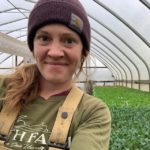 Abby Benson is the production coordinator at Featherstone Farm, an organic veggie farm in Rushford, Minnesota. Featherstone’s enterprises include about 140 acres of vegetables, a small organic apple orchard and pastured pigs. Abby loves growing brassicas, especially cabbages!
Abby Benson is the production coordinator at Featherstone Farm, an organic veggie farm in Rushford, Minnesota. Featherstone’s enterprises include about 140 acres of vegetables, a small organic apple orchard and pastured pigs. Abby loves growing brassicas, especially cabbages!
Succession management is vital to meet consistent demand for Featherstone Farm’s 1,400 summer CSA shares, 700 winter CSA shares and wholesale markets. Achieving this is done through staggered plantings, multiple varieties and managing the harvest of cut-and-come-again crops. Abby will share how Featherstone plans for managing and selling their many successions, particularly sweet corn, broccoli, cabbage, kale and hoophouse crops. She’ll also discuss how they make decisions when the timing gets off track or a planting fails.
Research on Improved Management Practices for Cereal Rye Ahead of Corn
Alison Robertson
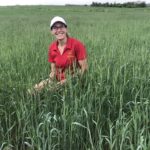 Alison Robertson is a professor and extension field pathologist in Iowa State University’s department of plant pathology, entomology and microbiology. Her research program focuses on oomycete pathogens of corn and soybeans that cause seedling disease. She is particularly interested in how crop production practices, like cover crops, affect the soil oomycete community. A goal of Alison’s program is to develop best management practices for cover crops in corn-soybean production.
Alison Robertson is a professor and extension field pathologist in Iowa State University’s department of plant pathology, entomology and microbiology. Her research program focuses on oomycete pathogens of corn and soybeans that cause seedling disease. She is particularly interested in how crop production practices, like cover crops, affect the soil oomycete community. A goal of Alison’s program is to develop best management practices for cover crops in corn-soybean production.
The Robertson Lab has been trying to understand factors that contribute to reduced corn yields following cereal rye. This session will share research results from various field trials done over the past few years, including those evaluating planting green, skip-row planting and cereal rye variety. Factors that may contribute to reduced yields will also be discussed.
Spill the Beans! Opportunities and Challenges Growing and Marketing Edible Beans in Iowa
Jason Grimm and Chris Henning
 Jason Grimm owns Grimm Family Farm near Williamsburg, Iowa. The family produces dry beans, potatoes and pastured poultry that are marketed to restaurants, grocers, school districts, food hubs and directly to consumers. Jason has extensive experience with on-farm poultry processing and has recently built a new plant to accept poultry from other farms. When Jason isn’t on the farm, he is the executive director for Iowa Valley RC&D, leveraging over 16 years of experience working in Iowa with local, state and national partners.
Jason Grimm owns Grimm Family Farm near Williamsburg, Iowa. The family produces dry beans, potatoes and pastured poultry that are marketed to restaurants, grocers, school districts, food hubs and directly to consumers. Jason has extensive experience with on-farm poultry processing and has recently built a new plant to accept poultry from other farms. When Jason isn’t on the farm, he is the executive director for Iowa Valley RC&D, leveraging over 16 years of experience working in Iowa with local, state and national partners.
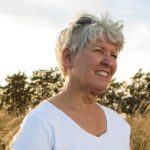 Chris Henning is a landowner from Cooper, Iowa, who works with her farmland tenant to incorporate conservation practices. In the early 2000s, she was the executive director of the Greene Bean Project, which brought together farmers and landowners to produce and market several edible bean varieties.
Chris Henning is a landowner from Cooper, Iowa, who works with her farmland tenant to incorporate conservation practices. In the early 2000s, she was the executive director of the Greene Bean Project, which brought together farmers and landowners to produce and market several edible bean varieties.
There are many edible bean varieties that offer an alternative to soybeans, offering nutritional benefits to humans and the soil. Chris Henning and Jason Grimm have both explored growing lesser-known bean varieties in Iowa, including black, adzuki and garbanzo beans. Learn from their experience about special equipment needs, marketing strategies and the unique opportunities and challenges of adding various edible bean varieties to rotations.
Haying Native Warm-Season Grasses
Elizabeth Steele
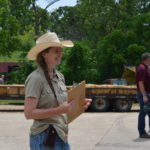 Elizabeth Steele works in her family’s native seed company, Hamilton Native Outpost, located in Elk Creek, Missouri. In addition to producing seed, they also raise cattle and bison almost exclusively on native forage in both savannas and open grasslands. Elizabeth and her husband, Loren, also raise meat goats and three children.
Elizabeth Steele works in her family’s native seed company, Hamilton Native Outpost, located in Elk Creek, Missouri. In addition to producing seed, they also raise cattle and bison almost exclusively on native forage in both savannas and open grasslands. Elizabeth and her husband, Loren, also raise meat goats and three children.
Native warm-season grasses are the grasses bison would have grazed during the summer on the prairie. Today, they can make a high tonnage of excellent-quality hay. These grasses are drought-tolerant, produce hay at a very low cost per ton and do not have nitrate or prussic acid toxicity problems. Beyond these benefits, native warm-season grass is cut late, in dryer weather, and can provide wildlife habitat. As with any hay crop, there are management guidelines. Come learn from Elizabeth’s experience haying these native grasses!
Starting Up a Goat Dairy and Creamery
Justin and Brittany Korver
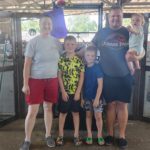 Justin and Brittany Korver met in the goat pens of 4-H, and their shared passion for goats grew into a lifelong love and a family dedicated to goat care. After completing their education, they began breeding goats on their Iowa goat farm and Justin started making cheese as a hobby. As he shared his creations, the demand for his Iowa goat cheese quickly grew. In 2023, Justin and Brittany founded Favorite, LLC, an Iowa goat creamery dedicated to crafting delicious, handcrafted cheese from their goats, along with award-winning goat cheese and gelato.,
Justin and Brittany Korver met in the goat pens of 4-H, and their shared passion for goats grew into a lifelong love and a family dedicated to goat care. After completing their education, they began breeding goats on their Iowa goat farm and Justin started making cheese as a hobby. As he shared his creations, the demand for his Iowa goat cheese quickly grew. In 2023, Justin and Brittany founded Favorite, LLC, an Iowa goat creamery dedicated to crafting delicious, handcrafted cheese from their goats, along with award-winning goat cheese and gelato.,
Justin and Brittany Korver are both experienced goat farmers and passionate cheese-making hobbyists. Together, they have channeled that love into a business. Come learn how they took their business from idea to reality. They’ll share how they researched the possibilities of launching a goat dairy – and discovered a strong market demand for both goat cheese and gelato. They’ll also share their experience with the logistics of starting a dairy, from building a creamery and getting financing to collaborating on a business partnership.
Aspiring-To-Farm Roundtable
Amber Mohr
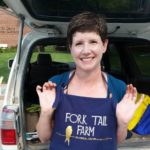 Amber Mohr farms with her family at Fork Tail Farm, a vegetable, fruit and poultry farm near Avoca, Iowa. She serves as project director of Avoca Main Street and is a farmland access navigator.
Amber Mohr farms with her family at Fork Tail Farm, a vegetable, fruit and poultry farm near Avoca, Iowa. She serves as project director of Avoca Main Street and is a farmland access navigator.
The Aspiring-To-Farm Roundtable is an open-format session where you’ll have the chance to swap farm dreams and network with kindred spirits. Join this group of your aspiring farmer peers to talk about resources, obstacles and what it would take for you to get started farming.
Advancing Wildlife Goals Through Strategic Habitat Management
Nick Thompson
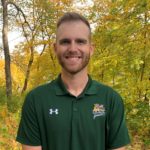 Nick Thompson is a Pheasants Forever senior farm bill biologist in southwest Iowa. Using farm bill programs, Nick works with private landowners to create and enhance wildlife habitat on farms ranging in size from half an acre to 500-plus acres. His goal is to create diverse, native ecosystems where a suite of wildlife can thrive.
Nick Thompson is a Pheasants Forever senior farm bill biologist in southwest Iowa. Using farm bill programs, Nick works with private landowners to create and enhance wildlife habitat on farms ranging in size from half an acre to 500-plus acres. His goal is to create diverse, native ecosystems where a suite of wildlife can thrive.
Pheasants Forever’s senior farm bill wildlife biologist, Nick Thompson, will lead a discussion focused on creating and managing native ecosystems to enhance wildlife habitat on private lands in Iowa. The discussion will cover a range of topics, from how to get started to assistance programs available with multiple organizations. You’ll hear about management techniques and strategies for improving and maintaining robust habitat. Nick will also highlight approaches for developing effective management plans tailored to individual habitat and wildlife goals. Be sure to bring your questions!
Friday Session 3: 1:30-2:30 p.m.
Being a Fabulous Farm Employer
Abby Benson and Sarah Janes Ugoretz
 Abby Benson is the production coordinator at Featherstone Farm, an organic veggie farm in Rushford, Minnesota. Featherstone’s enterprises include about 140 acres of vegetables, a small organic apple orchard and pastured pigs. Abby loves growing brassicas, especially cabbages!
Abby Benson is the production coordinator at Featherstone Farm, an organic veggie farm in Rushford, Minnesota. Featherstone’s enterprises include about 140 acres of vegetables, a small organic apple orchard and pastured pigs. Abby loves growing brassicas, especially cabbages!
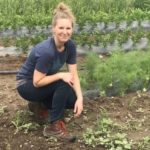 Sarah Janes Ugoretz serves as a farm labor educator at University of Wisconsin-Madison Extension in Dane County and works in close partnership with FairShare CSA Coalition. Her work focuses on supporting positive and professional farm labor practices and experiences for both farmworkers and farm owners.
Sarah Janes Ugoretz serves as a farm labor educator at University of Wisconsin-Madison Extension in Dane County and works in close partnership with FairShare CSA Coalition. Her work focuses on supporting positive and professional farm labor practices and experiences for both farmworkers and farm owners.
Building a work environment that attracts and keeps employees coming back is no easy task. But the long-term impacts of investing in this work can be significant for the farm and everyone on it. In this session, we’ll focus on three main topics: establishing strong communication, creating a professional and safe work environment and providing opportunities for growth. We’ll provide lots of concrete examples and can’t wait to hear yours!
Panel: Finding Your Balance With Farm Social Media
Whitney Clasen, Grant Gillon and Amanda Severson
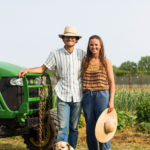 Whitney Clasen joined Grade A Gardens in 2016 after working on farms all around the world. She has a passion for growing healthy fruits and vegetables, and loves hosting on-farm dinners and events.
Whitney Clasen joined Grade A Gardens in 2016 after working on farms all around the world. She has a passion for growing healthy fruits and vegetables, and loves hosting on-farm dinners and events.
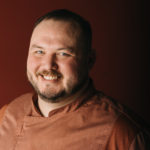 Grant Gillon is a private chef from Altoona, Iowa, focusing on bringing high-quality locally sourced meals right into your home. He specializes in multicourse private dinners prepared to your specifications. Grant was the winner of MasterChef: United Tastes of America with Gordon Ramsay.
Grant Gillon is a private chef from Altoona, Iowa, focusing on bringing high-quality locally sourced meals right into your home. He specializes in multicourse private dinners prepared to your specifications. Grant was the winner of MasterChef: United Tastes of America with Gordon Ramsay.
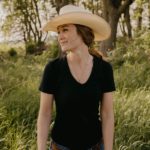 Amanda Severson owns and operates Grand View Beef with her husband, Knute Severson, near Clarion, Iowa. They use intensive rotational grazing to raise 100% grass-fed beef and sell directly to end consumers through their website, farmers markets and wholesale partnerships. Amanda is responsible for the farm’s marketing, finances and shipping program.
Amanda Severson owns and operates Grand View Beef with her husband, Knute Severson, near Clarion, Iowa. They use intensive rotational grazing to raise 100% grass-fed beef and sell directly to end consumers through their website, farmers markets and wholesale partnerships. Amanda is responsible for the farm’s marketing, finances and shipping program.
For building your brand and connecting with customers, social media is a powerful tool. But there’s a lot more to it than clicking “post.” Growing your social media presence introduces more complicated questions of privacy and boundaries, and how you balance this aspect of your farm’s visibility with your other farm work. Amanda, Whitney and Grant will explain their goals with social media, how they make content decisions and how they find their own balance.
From Planting to Termination: Cover Crop Selection and Termination Timing
Matt Rehberg
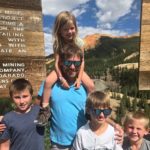 Matt Rehberg is a first-generation farmer in Darien, Wisconsin. He runs a row crop operation with around 2,000 acres of corn and beans, and a little bit of wheat and hay. Matt uses no-till or reduced-tillage methods on most of his acres. He is also vice president of the Wisconsin Soybean Association.
Matt Rehberg is a first-generation farmer in Darien, Wisconsin. He runs a row crop operation with around 2,000 acres of corn and beans, and a little bit of wheat and hay. Matt uses no-till or reduced-tillage methods on most of his acres. He is also vice president of the Wisconsin Soybean Association.
Choosing the right cover crop can be a daunting task. When you get past that hurdle, you need to figure out when and how to effectively terminate your cover crop. Matt Rehberg will discuss his experience with selecting cover crop species, and the methods he uses to terminate those cover crops while taking into account the species constraints and the following crop.
Roundtable: Brewing and Distilling Markets for Food-Grade Grain Growers
Wesley Rieth
 Wesley Rieth is the farm manager for LongView Farms, a row-crop grain operation in central Iowa that specializes in seed corn, commercial corn and soybean production using a range of conservation practices. Wesley previously managed the row crop operations at Granor Farm, a multienterprise diversified organic farm in southwest Michigan.
Wesley Rieth is the farm manager for LongView Farms, a row-crop grain operation in central Iowa that specializes in seed corn, commercial corn and soybean production using a range of conservation practices. Wesley previously managed the row crop operations at Granor Farm, a multienterprise diversified organic farm in southwest Michigan.
Are you interested in adding small grains to your rotation? Do you want to step into food-grade grains but are unsure what opportunities exist? Craft breweries and distilleries are increasingly prevalent across the Midwest as their popularity rises. These markets provide viable entry points into growing food-grade grains. Join Wesley Rieth and other grain farmers for a roundtable discussion of challenges and opportunities getting started with brewing and distilling markets.
The Relationships and Logistics of Solar Grazing
Josephine Trople
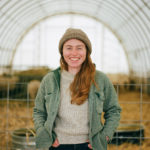 Josephine Trople founded Cannon Valley Graziers, LLC, a south-central Minnesota company specializing in adaptive grazing and targeted vegetation control. Using sheep and goat grazing, Josie applies her expertise in agriculture, land management and conservation to support ecological restoration and solar projects. Cannon Valley Graziers promotes biodiversity, soil health and water quality while providing sustainable land management solutions for landowners, communities and project managers.
Josephine Trople founded Cannon Valley Graziers, LLC, a south-central Minnesota company specializing in adaptive grazing and targeted vegetation control. Using sheep and goat grazing, Josie applies her expertise in agriculture, land management and conservation to support ecological restoration and solar projects. Cannon Valley Graziers promotes biodiversity, soil health and water quality while providing sustainable land management solutions for landowners, communities and project managers.
As solar panel installations become more commonplace across the landscape, the opportunity for graziers grows. But managing these sites can present challenges alongside that opportunity – not least of which are the many relationships a grazier has to navigate, from the landowner and solar company to the power company, land management company and others. Come hear from Josie as she shares her experience navigating the relationships and logistics of agrivoltaic grazing.
Land Access Navigator Consultation Live!
Hannah Breckbill, Andrea Boyd and Schontonia Davis
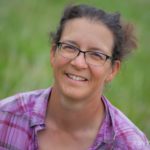 Hannah Breckbill has been farming since 2009 and started Humble Hands Harvest in Decorah, Iowa, in 2013. She is also cofounder of the Queer Farmer Network, a land access navigator with PFI and board president of the Farmer’s Land Investment Cooperative.
Hannah Breckbill has been farming since 2009 and started Humble Hands Harvest in Decorah, Iowa, in 2013. She is also cofounder of the Queer Farmer Network, a land access navigator with PFI and board president of the Farmer’s Land Investment Cooperative.
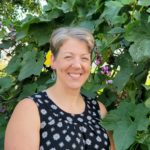 Andrea Boyd, a beginning farmer in West Des Moines, Iowa, has been growing herbs, flowers and veggies in her backyard. She works in information technology and is eager to spend more time outdoors with her family growing crops that nourish the land and her community. She is currently looking for land in the Des Moines area.
Andrea Boyd, a beginning farmer in West Des Moines, Iowa, has been growing herbs, flowers and veggies in her backyard. She works in information technology and is eager to spend more time outdoors with her family growing crops that nourish the land and her community. She is currently looking for land in the Des Moines area.
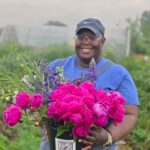 Schontonia Davis is a 2025 PFI Labor4Learning trainee at Mustard Seed Farm in Ames, Iowa. She is a Master Gardener with interests in seed-saving and container gardening. She is looking to dive deeper into her farming career and bring the joy of farming and gardening to everyone she meets.
Schontonia Davis is a 2025 PFI Labor4Learning trainee at Mustard Seed Farm in Ames, Iowa. She is a Master Gardener with interests in seed-saving and container gardening. She is looking to dive deeper into her farming career and bring the joy of farming and gardening to everyone she meets.
If you’re looking to start farming, you likely know how daunting the process can be. But did you know there are people trained to help? Farmland access navigators provide guidance and support to farmers beginning their careers. They help land seekers assess their readiness, identify suitable land, understand financing options and develop a land access plan. They also connect farmers with resources, legal advice and other relevant organizations. Come learn about the process as Hannah Breckbill, a farmland access navigator, consults with beginning farmers Schontonia Davis and Andrea Boyd.
Brush Management in CRP: What Is the Best Approach After Fire?
Laura Jackson
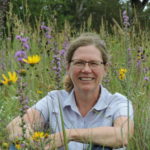 Laura Jackson is director of the Tallgrass Prairie Center at University of Northern Iowa. She has been a UNI biology faculty member since 1993, teaching courses related to ecology and conservation. Her research has focused on the restoration of biological diversity in agriculture landscapes, and seedling establishment in tallgrass prairie restoration.
Laura Jackson is director of the Tallgrass Prairie Center at University of Northern Iowa. She has been a UNI biology faculty member since 1993, teaching courses related to ecology and conservation. Her research has focused on the restoration of biological diversity in agriculture landscapes, and seedling establishment in tallgrass prairie restoration.
The Tallgrass Prairie Center has recently begun a partnership with Sustainable Agriculture Research and Education to explore brush management in agricultural grasslands. While prescribed fire is an effective tool, it is not always practical. In summer 2024, Laura Jackson and her team measured brush density in prairie strips and Conservation Reserve Program plantings in eastern Iowa. This session will present key findings and invite discussion on key challenges and promising management solutions. This session is part of the SARE Farmers Forum.
Friday Session 4: 3-4 p.m.
Growing Organic and Conventional Strawberries at White Pine Berry Farm
Andrew Zwald
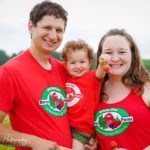 Andrew Zwald is the farm manager at White Pine Berry Farm in River Falls, Wisconsin. He grew up on the farm (a dairy farm at the time), graduated from University of Wisconsin-Madison and lived in Iowa with his wife, Kim, for six years selling corn, soy, alfalfa and cover crop seed. The family moved back to the farm in 2019. They grow strawberries, raspberries, blueberries, flowers and pumpkins and offer agritourism activities.
Andrew Zwald is the farm manager at White Pine Berry Farm in River Falls, Wisconsin. He grew up on the farm (a dairy farm at the time), graduated from University of Wisconsin-Madison and lived in Iowa with his wife, Kim, for six years selling corn, soy, alfalfa and cover crop seed. The family moved back to the farm in 2019. They grow strawberries, raspberries, blueberries, flowers and pumpkins and offer agritourism activities.
After many years of growing only MOSA Certified Organic crops, White Pine Berry Farm offered both conventional and organic strawberries for you-pick in 2025. Andrew will discuss the farm’s production practices and varieties for both systems, along with customer response to the shift and its financial impact on the farm.
Panel: Reducing Inputs Through Cover Crops
Randy Gamble, Mike Holden and Chase Stoll
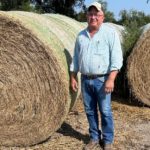 Randy Gamble has been farming in Madison County, Iowa, since 1980. He and his wife, Julie, have 300 acres of corn and soybeans, 500 acres of hay and 700 acres of pasture. They also raise 100 head of cattle. Randy has practiced no-till since he began farming and has since started using cover crops and other conservation practices. Randy says he wants to leave the land better than he found it for his three children, and many grandchildren.
Randy Gamble has been farming in Madison County, Iowa, since 1980. He and his wife, Julie, have 300 acres of corn and soybeans, 500 acres of hay and 700 acres of pasture. They also raise 100 head of cattle. Randy has practiced no-till since he began farming and has since started using cover crops and other conservation practices. Randy says he wants to leave the land better than he found it for his three children, and many grandchildren.
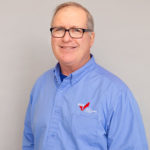 Mike Holden is a third-generation farmer who raises corn and soybeans, manages a cow-calf herd and a small feedlot and operates a private-label retail meat company near Scranton, Iowa. He earned a bachelor’s degree in finance from Creighton University in 1980. Mike started cover cropping eight years ago and now covers 40% of his acres.
Mike Holden is a third-generation farmer who raises corn and soybeans, manages a cow-calf herd and a small feedlot and operates a private-label retail meat company near Scranton, Iowa. He earned a bachelor’s degree in finance from Creighton University in 1980. Mike started cover cropping eight years ago and now covers 40% of his acres.
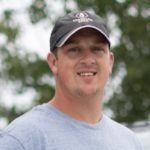 Chase Stoll lives in Lamoni, Iowa, with his wife, Danica, and their two daughters, Nola and Zella. The family farms both in northern Missouri (Harrison County) and southern Iowa (Decatur and Ringgold counties). Chris has 1,650 acres of corn and soybeans in rotation and began practicing strip-till and no-till in 2022.
Chase Stoll lives in Lamoni, Iowa, with his wife, Danica, and their two daughters, Nola and Zella. The family farms both in northern Missouri (Harrison County) and southern Iowa (Decatur and Ringgold counties). Chris has 1,650 acres of corn and soybeans in rotation and began practicing strip-till and no-till in 2022.
In this panel session, farmers Chase Stoll, Mike Holden and Randy Gamble will share what they have learned on their journeys to reduce inputs on their farms. They will discuss how cover crops are part of the formula to achieve their soil health and input reduction goals. The audience will also have a chance to ask the panelists questions about reducing their reliance on inputs.
The “Green” Benefits of Grazing Cover Crops
Eric Heins
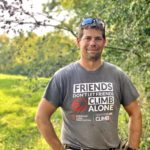 Eric Heins owns and operates Hoosier Ridge Ranch in Altura, Minnesota, alongside his wife Michelle. They grow small grains, canola, soybeans and hay. They also raise 100% grass-fed and grass-finished cattle along with pastured poultry that they sell directly to consumers. Eric and Michelle have worked to grow their grass-fed cattle operation alongside their custom grazing services by taking traditional row crop land, developing it into high-quality pastures and pairing it with cover crop grazing.
Eric Heins owns and operates Hoosier Ridge Ranch in Altura, Minnesota, alongside his wife Michelle. They grow small grains, canola, soybeans and hay. They also raise 100% grass-fed and grass-finished cattle along with pastured poultry that they sell directly to consumers. Eric and Michelle have worked to grow their grass-fed cattle operation alongside their custom grazing services by taking traditional row crop land, developing it into high-quality pastures and pairing it with cover crop grazing.
Over the last 50 years, livestock have left many farms. Eric Heins is doing the reverse: bringing cattle back to his land. Eric will discuss how he uses his Normande-shorthorn crosses in a variety of grazing situations. You’ll also learn how Eric uses his cattle to graze cover crop mixes, and how this practice has improved his bottom line.
Bale Grazing and Cover Crop Finishing: A Cooperators’ Program Share-Out
Ron Mardesen and Adam Ledvina
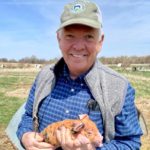 A Frame Acres has been in the Mardesen family for five generations. Today, three generations still work the farm. Ron Mardesen’s mom helps with the cattle; Ron and his wife, Denise, run the hogs; and their three children, Matty, Michael and Anna, help out as well. The Mardesens raise as few as 450 hogs up to 1,300 a year, depending on how much corn they harvest the year prior. They mostly grow corn with soybeans in rotation alongside alfalfa, oats and livestock.
A Frame Acres has been in the Mardesen family for five generations. Today, three generations still work the farm. Ron Mardesen’s mom helps with the cattle; Ron and his wife, Denise, run the hogs; and their three children, Matty, Michael and Anna, help out as well. The Mardesens raise as few as 450 hogs up to 1,300 a year, depending on how much corn they harvest the year prior. They mostly grow corn with soybeans in rotation alongside alfalfa, oats and livestock.
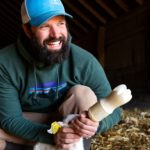 Adam Ledvina runs a large-scale holistic meat goat operation, Iowa Kiko Goats, based in Tama County, Iowa. Adam’s forage-based operation focuses on low-maintenance, high-performance animals through highly selective breeding and data collection. Through rotational grazing, use of cover crops and good herd management, he has achieved high birth rates and high wean weights with little to no inputs. As a result, Adam has grown his herd to well over 1,000 goats from starting with just five goats in 2013. He has been full-time with his operation since 2020.
Adam Ledvina runs a large-scale holistic meat goat operation, Iowa Kiko Goats, based in Tama County, Iowa. Adam’s forage-based operation focuses on low-maintenance, high-performance animals through highly selective breeding and data collection. Through rotational grazing, use of cover crops and good herd management, he has achieved high birth rates and high wean weights with little to no inputs. As a result, Adam has grown his herd to well over 1,000 goats from starting with just five goats in 2013. He has been full-time with his operation since 2020.
Farmers in Practical Farmers’ Cooperators’ Program conduct on-farm research to better answer their most challenging farming questions. Adam bale-grazes goats on pasture and was curious to learn how animal traffic near the unspooled bales affected the soil and plant community. Ron wanted to know if it was cost-effective to finish pigs on a diverse cover crop mix versus in a barn. Come hear how they did their trials, and what they discovered.
The Lost Tallgrass Prairie: Farming, History and Roots in Land Stewardship Today
Dave Hage and Josephine Marcotty
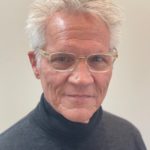 Dave Hage oversaw environmental and health reporting at the Minneapolis Star Tribune for a dozen years, editing projects that won a Pulitzer Prize and an Edward R. Murrow Award, among other honors. In May 2025, he and coauthor Josephine Marcotty published “Sea of Grass: The Conquest, Ruin, and Redemption of Nature on the American Prairie.” Dave’s previous books include “No Retreat, No Surrender: Labor’s War at Hormel” and “Reforming Welfare by Rewarding Work.” A Minneapolis native, he lives in St. Paul, Minnesota, with his wife.
Dave Hage oversaw environmental and health reporting at the Minneapolis Star Tribune for a dozen years, editing projects that won a Pulitzer Prize and an Edward R. Murrow Award, among other honors. In May 2025, he and coauthor Josephine Marcotty published “Sea of Grass: The Conquest, Ruin, and Redemption of Nature on the American Prairie.” Dave’s previous books include “No Retreat, No Surrender: Labor’s War at Hormel” and “Reforming Welfare by Rewarding Work.” A Minneapolis native, he lives in St. Paul, Minnesota, with his wife.
 Josephine Marcotty is an award-winning environmental journalist who has spent her life in the Midwest. She was a reporter for the Minneapolis Star Tribune, where she covered complex, science-based topics. “Sea of Grass,” the book she coauthored with Dave Hage, is a natural expansion of her reporting on the vanishing prairie and the consequences of intensive agriculture. She lives in Minneapolis with her husband.
Josephine Marcotty is an award-winning environmental journalist who has spent her life in the Midwest. She was a reporter for the Minneapolis Star Tribune, where she covered complex, science-based topics. “Sea of Grass,” the book she coauthored with Dave Hage, is a natural expansion of her reporting on the vanishing prairie and the consequences of intensive agriculture. She lives in Minneapolis with her husband.
Discover Iowa’s lost tallgrass prairie through stories weaving together ecology, history, agriculture and identity. Authors Dave Hage and Josephine Marcotty draw from their book, “Sea of Grass,” to explore the conquest and transformation of America’s grasslands, and the lives of settlers who transformed the land. This session is intended to inspire discussion and renewed stewardship in landowners and farmers by reminding them that their own roots are still deeply dug in the prairie we once had.
A Conversation About Mental Health
Keisha McClish Couts and Anna Killpack
 Keisha McClish Couts lives in Park City, Kansas, close to Pearson Family Farm where Keisha’s grandfather started the first urban farm in Wichita. Keisha is the CEO of Renewed LLC, where she serves as mental health specialist and mental health first aid responder to farmers in rural and urban areas.
Keisha McClish Couts lives in Park City, Kansas, close to Pearson Family Farm where Keisha’s grandfather started the first urban farm in Wichita. Keisha is the CEO of Renewed LLC, where she serves as mental health specialist and mental health first aid responder to farmers in rural and urban areas.
 Anna Killpack is the executive director of NAMI Southwest Iowa, where she leads efforts to expand education, support and advocacy for individuals and families impacted by mental illness. With more than 20 years of nonprofit leadership experience, Anna has helped grow innovative programs for the nine counties she serves.
Anna Killpack is the executive director of NAMI Southwest Iowa, where she leads efforts to expand education, support and advocacy for individuals and families impacted by mental illness. With more than 20 years of nonprofit leadership experience, Anna has helped grow innovative programs for the nine counties she serves.
Farming isn’t just physically intensive; it can also be emotionally and intellectually difficult. Come prepared with questions and listen in as Keisha McClish Couts and Anna Killpack share a conversation about pressing questions and challenges for farmers’ mental health – and how to tend to your mental health as a farmer. Anna will provide attendees with practical tools to stay healthy.
Relay Cropping as Resilience When Waters Rise
Doug Adams and Ross Evelsizer
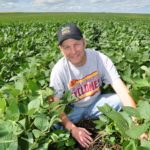 Doug Adams is a sixth-generation row crop farmer in Humboldt, Iowa. He extends his rotation with oats and wheat and uses strip-till, no-till and cover crops. Doug recently retired from working for the Natural Resources Conservation Service, where he helped farmers with terraces, waterways and soil health.
Doug Adams is a sixth-generation row crop farmer in Humboldt, Iowa. He extends his rotation with oats and wheat and uses strip-till, no-till and cover crops. Doug recently retired from working for the Natural Resources Conservation Service, where he helped farmers with terraces, waterways and soil health.
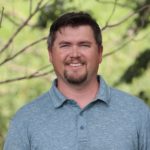 Ross Evelsizer is the natural resource projects director for Northeast Iowa RC&D. He has over 12 years of experience coordinating conservation partnerships, watershed improvement initiatives and grant-funded projects. Ross helped develop a grassroots effort to explore multicropping and relay cropping that is now being practiced by many producers in Iowa.
Ross Evelsizer is the natural resource projects director for Northeast Iowa RC&D. He has over 12 years of experience coordinating conservation partnerships, watershed improvement initiatives and grant-funded projects. Ross helped develop a grassroots effort to explore multicropping and relay cropping that is now being practiced by many producers in Iowa.
Relay cropping is the practice of planting a second crop into a first crop that is already well established, and harvesting both in the same season. In Iowa, this most commonly involves planting soybeans into a standing small-grain crop, usually wheat or rye. Hear from Doug about important considerations and soil health benefits of relay cropping. Then learn about Ross’ research into the flood mitigation potential of this farming practice.
Creating Recipe Videos and Shareable Content for Social Media
Grant Gillon
 Grant Gillon is a private chef from Altoona, Iowa, focusing on bringing high-quality locally sourced meals right into your home. He specializes in multicourse private dinners prepared to your specifications. Grant was the winner of MasterChef: United Tastes of America with Gordon Ramsay.
Grant Gillon is a private chef from Altoona, Iowa, focusing on bringing high-quality locally sourced meals right into your home. He specializes in multicourse private dinners prepared to your specifications. Grant was the winner of MasterChef: United Tastes of America with Gordon Ramsay.
Are your customers asking for recipe ideas? Are you drooling over the smoothly edited cooking videos on your Instagram? If you’re curious about making those videos to promote your farm products, this session is for you. Chef Grant (@grant_gillon on Instagram) will share his process and gear for creating recipe videos and other shareable content for social media, featuring a live demonstration during the session.
PFI Storytelling: 4:45-5:45 p.m.
Meet the Storytellers
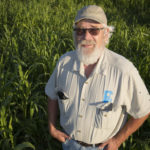 Mark Peterson farms about 500 acres of corn and soybeans with his wife, Melanie Peterson, at Bent Gate Farm near Stanton, Iowa. They also rent and are transferring acres to their son, Monroe, for his hay business. Mark is a past board president of PFI, and a longtime promoter of cover crops.
Mark Peterson farms about 500 acres of corn and soybeans with his wife, Melanie Peterson, at Bent Gate Farm near Stanton, Iowa. They also rent and are transferring acres to their son, Monroe, for his hay business. Mark is a past board president of PFI, and a longtime promoter of cover crops.
 Amanda Severson owns and operates Grand View Beef with her husband, Knute Severson, near Clarion, Iowa. They use intensive rotational grazing to raise 100% grass-fed beef and sell directly to end consumers through their website, farmers markets and wholesale partnerships. Amanda is responsible for the farm’s marketing, finances and shipping program.
Amanda Severson owns and operates Grand View Beef with her husband, Knute Severson, near Clarion, Iowa. They use intensive rotational grazing to raise 100% grass-fed beef and sell directly to end consumers through their website, farmers markets and wholesale partnerships. Amanda is responsible for the farm’s marketing, finances and shipping program.
 Todd Western IV, and his father, Todd Western III, farm their 1864 historic family farm in New Sharon, Iowa, in addition to a newer farm near Waterloo, Iowa. They primarily farm corn and soybeans and use cover crops on the row crop ground of Western Family Farms. Todd IV has also diversified into a growing urban farm business “Freedom Farms.” The Westerns, as sixth- and seventh-generation farmers, have taken great care to preserve their family farming legacy and the legacy of Black farmers.
Todd Western IV, and his father, Todd Western III, farm their 1864 historic family farm in New Sharon, Iowa, in addition to a newer farm near Waterloo, Iowa. They primarily farm corn and soybeans and use cover crops on the row crop ground of Western Family Farms. Todd IV has also diversified into a growing urban farm business “Freedom Farms.” The Westerns, as sixth- and seventh-generation farmers, have taken great care to preserve their family farming legacy and the legacy of Black farmers.
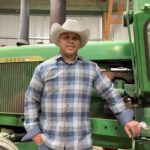 Todd Western III and his son, Todd Western IV, farm their 1864 historic family farm in New Sharon, Iowa, in addition to a newer farm near Waterloo, Iowa. They primarily farm corn and soybeans and use cover crops on the row crop ground of Western Family Farms. Todd IV has also diversified into a growing urban farm business “Freedom Farms.” The Westerns, as sixth- and seventh-generation farmers, have taken great care to preserve their family farming legacy and the legacy of Black farmers.
Todd Western III and his son, Todd Western IV, farm their 1864 historic family farm in New Sharon, Iowa, in addition to a newer farm near Waterloo, Iowa. They primarily farm corn and soybeans and use cover crops on the row crop ground of Western Family Farms. Todd IV has also diversified into a growing urban farm business “Freedom Farms.” The Westerns, as sixth- and seventh-generation farmers, have taken great care to preserve their family farming legacy and the legacy of Black farmers.
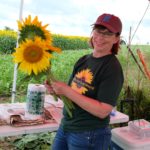 Ann and Eric Franzenburg own and operate Pheasant Run Farm near Van Horne, Iowa, a diversified farm producing row crops, cut flowers, fruits, vegetables, and more. They welcome visitors each year for seasonal agritourism events like the Sunflower Experience and Dahlia Days. Their next venture includes raising shrimp and expanding into direct sales through a new on-farm market.
Ann and Eric Franzenburg own and operate Pheasant Run Farm near Van Horne, Iowa, a diversified farm producing row crops, cut flowers, fruits, vegetables, and more. They welcome visitors each year for seasonal agritourism events like the Sunflower Experience and Dahlia Days. Their next venture includes raising shrimp and expanding into direct sales through a new on-farm market.
 Jill Beebout runs Blue Gate Farm with her husband, Sean Skeehan. They steward 40 acres of family land in southern Marion County, Iowa, where they raise Certified Naturally Grown produce, hay and alpacas, marketing through CSA and VegEmail custom sales.
Jill Beebout runs Blue Gate Farm with her husband, Sean Skeehan. They steward 40 acres of family land in southern Marion County, Iowa, where they raise Certified Naturally Grown produce, hay and alpacas, marketing through CSA and VegEmail custom sales.
It’s a tradition! To cap off Friday afternoon, all conference attendees will come together to hear true stories, performed live, from a selection of PFI farmers. If you enjoy bending your ear toward a lively, soberingly powerful or particularly well-narrated farmer tale, this storytelling event is for you. Jill Beebout will once again emcee as Mark Peterson, Amanda Severson, Todd Western IV, Todd Western III and Ann Franzenburg share their stories.
Grab a bag of popcorn on your way in!
Saturday Session 1: 9:30-10:30 a.m.
Recovering Vegetable Farmers Go Nuts!: Transitioning to Agroforestry
Katie Hochstedler and Nicki Morgan
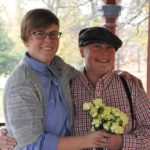
 Katie Hochstedler and Nicki Morgan are recovering vegetable farmers transitioning to perennial nuts and fruits. In 2025, they moved to Riverside, Iowa, near Katie’s home community, and launched HartWood where they planted their first trees, including chestnuts, pawpaws, persimmons and a diverse selection of berries. With a goal of engaging more with the community, Katie and Nicki plan to establish a you-pick and host community learning events. With Katie’s background in culinary arts, they will expand into value-added processing in the coming years.
Katie Hochstedler and Nicki Morgan are recovering vegetable farmers transitioning to perennial nuts and fruits. In 2025, they moved to Riverside, Iowa, near Katie’s home community, and launched HartWood where they planted their first trees, including chestnuts, pawpaws, persimmons and a diverse selection of berries. With a goal of engaging more with the community, Katie and Nicki plan to establish a you-pick and host community learning events. With Katie’s background in culinary arts, they will expand into value-added processing in the coming years.
After a decade of diversified vegetable production, CSAs, farmers markets – and no time off – Katie and Nicki decided to go nuts, transitioning to agroforestry production focused on chestnuts, pawpaws, persimmons and other fruit and nut crops. They are in the beginning stages of this journey and will discuss considerations such as land access, site selection, sourcing plant materials, planting, management and how they plan to market their future harvest. This conscious change also brings a focus on long-term ecological regeneration, work-life balance and intentional connection to community.
Top 10 Takeaways From Visiting Iowa Fruit and Vegetable Farms in 2025
Dan Fillius
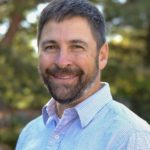 Dan Fillius is the commercial vegetable and specialty crop specialist with ISU Extension and Outreach. Prior to this role, Dan spent more than 14 years managing vegetable farms in Michigan, Minnesota and Iowa. He brings a wealth of practical knowledge and vision to commercial horticulture in Iowa.
Dan Fillius is the commercial vegetable and specialty crop specialist with ISU Extension and Outreach. Prior to this role, Dan spent more than 14 years managing vegetable farms in Michigan, Minnesota and Iowa. He brings a wealth of practical knowledge and vision to commercial horticulture in Iowa.
Dan Fillius logged thousands of miles on the road during 2025, visiting over 50 farms around Iowa. He walked fields, looked at plants, asked questions and listened to what was on farmers’ minds. During this session, he’ll reveal his top 10 takeaways, which may include discussion of leaf spots, weird germination and complications from the heat that just wouldn’t quit.
Tips for Success: Cereal Rye Termination and Planting Green With Corn
Tony Peirick
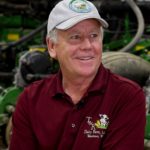 Tony Peirick farms with his brother and their two sons at T&R Dairy Farm LLC near Watertown, Wisconsin. They have a 200-cow dairy, 1,100 acres of crops and have been practicing no-till since 1994 and planting cover crops since 2004. In 2019, their farm received the Land and Water Conservation Farm Family of the Year Award.
Tony Peirick farms with his brother and their two sons at T&R Dairy Farm LLC near Watertown, Wisconsin. They have a 200-cow dairy, 1,100 acres of crops and have been practicing no-till since 1994 and planting cover crops since 2004. In 2019, their farm received the Land and Water Conservation Farm Family of the Year Award.
Have you heard that you shouldn’t plant corn green into rye because of the rye’s allelopathic effect on the corn? Tony Peirick ignored that advice and has been planting corn green for a decade into rye and other cover crops. Hear about his experience with that practice, the benefits of using cover crops before corn and why you should try it too.
Farming for the Future: Engaging the Whole Family and Raising Young Entrepreneurs
Jackson, Amanda, Richard and Andy Drost
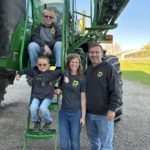 Drost Farms is a family-run operation in Mahaska County, Iowa, growing corn, soybeans, hay, alfalfa and oats. Richard and Andy Drost started their own popcorn business, Drost Brothers Popcorn, learning responsibility and entrepreneurship alongside their parents, Jackson and Amanda Drost.
Drost Farms is a family-run operation in Mahaska County, Iowa, growing corn, soybeans, hay, alfalfa and oats. Richard and Andy Drost started their own popcorn business, Drost Brothers Popcorn, learning responsibility and entrepreneurship alongside their parents, Jackson and Amanda Drost.
At Drost Farms, the kids aren’t just helping – they’re building something of their own. Richard (11) and Andy (5) are learning to grow, market and sell popcorn through their small business, Drost Brothers Popcorn. Come hear how parents Amanda and Jackson are stewarding their farm for the future and raising the next generation of entrepreneurs. Kids and families are encouraged to attend!
Grazing Diverse Native Grasslands for Livestock, Soil Health and Wildlife
Elizabeth Steele
 Elizabeth Steele works in her family’s native seed company, Hamilton Native Outpost, located in Elk Creek, Missouri. In addition to producing seed, they also raise cattle and bison almost exclusively on native forage in both savannas and open grasslands. Elizabeth and her husband, Loren, also raise meat goats and three children.
Elizabeth Steele works in her family’s native seed company, Hamilton Native Outpost, located in Elk Creek, Missouri. In addition to producing seed, they also raise cattle and bison almost exclusively on native forage in both savannas and open grasslands. Elizabeth and her husband, Loren, also raise meat goats and three children.
Prairies and savannas once covered our land, building our rich prairie soil. Today, these grasslands can be re-created to provide excellent livestock forage, wildlife habitat and soil health. The farmers at Diverse Native Grasslands include native warm-season grasses, native cool-season grasses and native forbs and legumes in their pastures. Due to this plant diversity, they’re able to provide year-round forage for livestock. Come learn from Elizabeth about getting the right plant in the right place – and good grazing management – so you can make native grasses work for you.
Growing and Milling Pig Feed
Brice Hundling
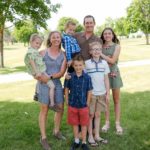 Brice Hundling and his wife, Melanie Hundling, run a diversified family farm in Breda, Iowa. Together, they raise pigs and cattle for Niman Ranch, along with sheep, goats, ducks, geese, laying hens, broilers, turkeys, peacocks, guineas, bees and several grain varieties.
Brice Hundling and his wife, Melanie Hundling, run a diversified family farm in Breda, Iowa. Together, they raise pigs and cattle for Niman Ranch, along with sheep, goats, ducks, geese, laying hens, broilers, turkeys, peacocks, guineas, bees and several grain varieties.
Feed is a key part of getting significant and efficient gains on pigs. Brice Hundling grows and mills the feed for his pigs himself. Doing so gives him direct control over the quality and content of what his pigs eat. Come hear Brice share how what he grows influences what goes into his feed. He’ll explain his feed mill setup, and describe how he manages making specialty feed for each stage of a pig’s life.
Growing African Vegetables in Iowa
Esta Minani
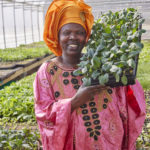 Born in Burundi, Esta Minani started her farming journey after her family fled to a refugee camp in Congo when she was six years old. She later farmed with her husband in Tanzania, resettled in Vermont, then moved to Iowa and started Lenga Lenga Farm in West Des Moines, Iowa, at Global Greens.
Born in Burundi, Esta Minani started her farming journey after her family fled to a refugee camp in Congo when she was six years old. She later farmed with her husband in Tanzania, resettled in Vermont, then moved to Iowa and started Lenga Lenga Farm in West Des Moines, Iowa, at Global Greens.
Listen as Esta Minani, owner and operator of Lenga Lenga Farm, talks about growing culturally relevant vegetables, scaling up and building a business in Iowa. She grows veggies like lenga lenga (an amaranth green), peppers, corn and eggplant, selling her produce directly to consumers at the Global Greens market in Des Moines. Recently, Esta has scaled up her operation at a new location in Grimes.
Note: This session will be in Kirundi. If you’d like to listen in English, please pick up an interpretive headset on your way into the room.
Soil, Water and Habitat Stewardship on Working Lands
Ryan Schmidt, Emery Davis and Kent Stuart
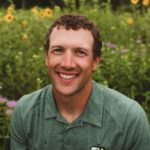 Ryan Schmidt is the central Iowa land stewardship director for Iowa Natural Heritage Foundation. He works to diversify Iowa’s landscape through the use of prescribed fire, managing invasive plants, grazing, prairie reconstruction and conservation-focused agriculture. Growing up on his family farm in southeast Iowa, Ryan developed a passion for Iowa’s flora and fauna and spent his early career focused on restoring native plant and wildlife communities. He lives on a small farm in Jasper County, where he is a gardener, bird-watcher and prairie enthusiast.
Ryan Schmidt is the central Iowa land stewardship director for Iowa Natural Heritage Foundation. He works to diversify Iowa’s landscape through the use of prescribed fire, managing invasive plants, grazing, prairie reconstruction and conservation-focused agriculture. Growing up on his family farm in southeast Iowa, Ryan developed a passion for Iowa’s flora and fauna and spent his early career focused on restoring native plant and wildlife communities. He lives on a small farm in Jasper County, where he is a gardener, bird-watcher and prairie enthusiast.
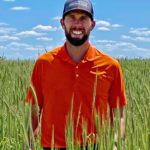 Emery Davis farms near the ISU Research and Demonstration Farm in rural Crawfordsville, Iowa, where he raises corn, soybeans and small grains using practices such as no-till, cover crops and reduced inputs. Over the last 10 years, he has helped many farmers install prairie to improve soil, water and habitat quality on their farms. His own farm includes about 70 acres of strategically placed prairie to support water quality and wildlife goals. Emery is a longtime participant in the PFI Cooperators’ Program and also serves as a conservation agronomist with Heartland Co-op in eastern Iowa.
Emery Davis farms near the ISU Research and Demonstration Farm in rural Crawfordsville, Iowa, where he raises corn, soybeans and small grains using practices such as no-till, cover crops and reduced inputs. Over the last 10 years, he has helped many farmers install prairie to improve soil, water and habitat quality on their farms. His own farm includes about 70 acres of strategically placed prairie to support water quality and wildlife goals. Emery is a longtime participant in the PFI Cooperators’ Program and also serves as a conservation agronomist with Heartland Co-op in eastern Iowa.
 Kent Stuart farms in Cedar County near West Branch, Iowa. His family first came to the area in 1851 and has been using conservation practices since the mid-1970s. The Stuarts frequently host field days to showcase their practices. In 2021, Kent and his uncle, Ken, were recognized as Conservation Farmers of the Year by the Iowa Department of Agriculture and Land Stewardship. Kent currently is a commissioner with the Cedar County Soil and Water Conservation District. He is also a regional director for the Conservation Districts of Iowa and serves on the State Soil Conservation and Water Quality Committee.
Kent Stuart farms in Cedar County near West Branch, Iowa. His family first came to the area in 1851 and has been using conservation practices since the mid-1970s. The Stuarts frequently host field days to showcase their practices. In 2021, Kent and his uncle, Ken, were recognized as Conservation Farmers of the Year by the Iowa Department of Agriculture and Land Stewardship. Kent currently is a commissioner with the Cedar County Soil and Water Conservation District. He is also a regional director for the Conservation Districts of Iowa and serves on the State Soil Conservation and Water Quality Committee.
Across Iowa, farmers and conservationists are finding practical ways to balance production with stewardship. Ryan Schmidt of the Iowa Natural Heritage Foundation works to convert cropland to prairie and habitat. Conservation agronomist and farmer Emery Davis shares expertise in no-till, cover crops and watershed practices. Farmer Kent Stuart integrates saturated buffers, CRP habitat and tree plantings. Join this panel to explore tested approaches for soil, water and wildlife conservation.
Saturday Session 2: 11 a.m.-Noon
Seed and Scion Swap
We’re finally doing it: This session is a seed swap! All are welcome, but bringing seeds or scion to share is encouraged. Please label your seeds and scion with the following information: crop type, common name and variety, year the seeds were collected, where the seeds were grown and any other information you wish to share. Please do not bring seeds or plants that are considered illegal, noxious or invasive; that are from unknown origins; or that are poisonous or coated with restricted-use pesticides.
Crop Focus: Kiwiberry Production
Jeff Sindelar
 Jeff Sindelar runs Little Deb’s Berry Farm with his wife, Deb, outside Newhall, Iowa. They specialize in less common perennial crops, particularly honeyberries, kiwiberries and pink lemonade blueberries. A mechanic by trade, Jeff enjoys testing and tinkering with new crops and varieties to find what works.
Jeff Sindelar runs Little Deb’s Berry Farm with his wife, Deb, outside Newhall, Iowa. They specialize in less common perennial crops, particularly honeyberries, kiwiberries and pink lemonade blueberries. A mechanic by trade, Jeff enjoys testing and tinkering with new crops and varieties to find what works.
Kiwiberry, also known as hardy kiwi, is a perennial crop native to Japan, Korea, northern China and Russia that grows well in Iowa, too. The fruit, which tastes and looks much like a kiwi on the inside, is about 10 grams (the size of a large grape), and is eaten whole – no peeling! Jeff Sindelar harvested 800 pounds of kiwiberry on his farm in 2024, which he sold primarily to local schools. Jeff will share photos from his farm and discuss varieties, sourcing, plant management, harvest and handling.
The Versatility and Efficiency of Drones
Mark Kingland
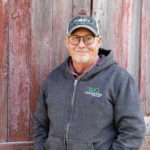 Mark Kingland and his wife, Brenda Kingland, operate their 120-year-old family farm in Winnebago County, Iowa, farming 1,800 acres of owned and leased cropland. They started farming in 1981 alongside Mark’s brother. Mark enjoys implementing technology into his operations and has used drones since 2022 for spraying and seeding cover crops.
Mark Kingland and his wife, Brenda Kingland, operate their 120-year-old family farm in Winnebago County, Iowa, farming 1,800 acres of owned and leased cropland. They started farming in 1981 alongside Mark’s brother. Mark enjoys implementing technology into his operations and has used drones since 2022 for spraying and seeding cover crops.
Mark Kingland started planting cover crops in 2023 on 190 acres, then purchased a drone to do the planting. He also uses the drone to apply fungicide because of its accuracy and ability to map and record data. In 2024, Mark planted 1,000 acres of cover crops and applied fungicide on 1,700 acres between his own acres and custom work. In this session, he’ll discuss the versatility of drones and how he uses them in his drone business.
Storytelling Techniques To Foster Collaboration and Promote Farmland Conservation
Tamara Deal and Linda Shenk
 Tamara Deal worked in various corporate information technology positions prior to starting her own internet consulting business. In 2011, she was asked to return to Iowa to manage her family farm business interests. She continues to learn about agriculture focusing on farm management and conservation practices.
Tamara Deal worked in various corporate information technology positions prior to starting her own internet consulting business. In 2011, she was asked to return to Iowa to manage her family farm business interests. She continues to learn about agriculture focusing on farm management and conservation practices.
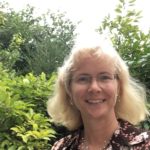 Linda Shenk is a professor of English at Iowa State University and leads transdisciplinary research related to sustainable agriculture. She applies her background in the humanities to conducting collaborative storytelling amongst researchers, farmers and landowners to co-create knowledge and action.
Linda Shenk is a professor of English at Iowa State University and leads transdisciplinary research related to sustainable agriculture. She applies her background in the humanities to conducting collaborative storytelling amongst researchers, farmers and landowners to co-create knowledge and action.
Every farm has a story and each farmer or landowner has their own unique connection to it. Making positive change on a farm or landscape often means inviting others into that story to conserve the land for future generations. In this workshop session, Linda and Tammy invite you to explore the future of your agriculture story through storytelling, relationship-building and community engagement. We suggest (but it’s not required!) that you bring some object that evokes how your connection to the land has changed – a photo, an aerial image of your farm, a family memento.
Virtual Fencing 101
Matt Vermeersch
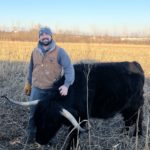 Matt Vermeersch is a first-generation farmer who, with his wife Jocelyn Vermeersch, is raising Scottish Highland cattle with a targeted sheep and goat grazing business. In early 2024, they moved from their small acreage to oversee the transition of Maggie McQuown’s 170-acre row crop farm into a grazing-focused farm with perennial grasses, prairie and trees.
Matt Vermeersch is a first-generation farmer who, with his wife Jocelyn Vermeersch, is raising Scottish Highland cattle with a targeted sheep and goat grazing business. In early 2024, they moved from their small acreage to oversee the transition of Maggie McQuown’s 170-acre row crop farm into a grazing-focused farm with perennial grasses, prairie and trees.
Getting livestock back on the land, or increasing management levels, can have a host of benefits for the landscape. But time and infrastructure needs can be major barriers. As technology develops, those issues decrease and new opportunities open up. Join Matt as he shows from experience how virtual fencing can improve your operation by easily introducing or improving rotations. Learn how to put your animals where fences can’t go and keep them out of areas you want them to stay out of.
All The Pieces: Completing the Soil Health Puzzle by Adding Cattle and Reducing Herbicides
Jordan Uldrich
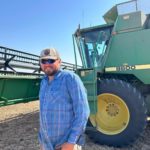 Jordan Uldrich is a sixth-generation farmer from south-central Nebraska. He has been back at the family farm since 2013. He and his dad custom-farm, have a small beef herd and raise corn and soybeans. They have been no-till for the last 25 years. Jordan is passionate about soil health because of impacts on our ecosystems, water supplies, land and the economic potential it has for farmers, ranchers and their communities.
Jordan Uldrich is a sixth-generation farmer from south-central Nebraska. He has been back at the family farm since 2013. He and his dad custom-farm, have a small beef herd and raise corn and soybeans. They have been no-till for the last 25 years. Jordan is passionate about soil health because of impacts on our ecosystems, water supplies, land and the economic potential it has for farmers, ranchers and their communities.
Jordan Uldrich is a sixth-generation farmer who started down the path of regenerative agriculture when looking for alternative options for a field with herbicide-resistant weeds. He realized he was missing many pieces of the soil health puzzle. He brought back cattle and incorporated cover crops. Jordan will discuss his progress towards reducing herbicide use to one pass a year, incorporating cattle and how this financially has made sense.
How To Sell to a Food Hub
Tommy Hexter and Ashley Wenke
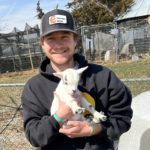 Tommy Hexter is an Iowa transplant who grew up on a 2-acre vegetable and egg farm in the mountains of central Virginia. He is now the executive director of Grinnell Farm To Table and policy director for Iowa Farmers Union.
Tommy Hexter is an Iowa transplant who grew up on a 2-acre vegetable and egg farm in the mountains of central Virginia. He is now the executive director of Grinnell Farm To Table and policy director for Iowa Farmers Union.
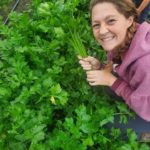 Ashley Wenke co-owns and operates Pleasant Grove Homestead near Montezuma, Iowa, providing meat, produce, eggs and honey to surrounding communities through farmers markets, cooperatives and other direct-to-consumer channels. Ashley and her husband, Zachary, also work with a variety of food hubs to extend their market reach.
Ashley Wenke co-owns and operates Pleasant Grove Homestead near Montezuma, Iowa, providing meat, produce, eggs and honey to surrounding communities through farmers markets, cooperatives and other direct-to-consumer channels. Ashley and her husband, Zachary, also work with a variety of food hubs to extend their market reach.
Are you thinking of selling to a food hub but aren’t sure where to start? Join Tommy Hexter and Ashley Wenke as they share specifics about selling to an aggregator. You’ll hear from both a farmer and food hub perspective. You’ll also learn about crop and farm planning based on local demand and building relationships with your local food hub.
Keynote Address: 1:15-2:15 p.m.
10 Ways To Build a Better World With Bread and Beer
Amber Lambke
Amber Lambke is cofounder and CEO of Maine Grains, Inc., a gristmill housed in a repurposed jailhouse that has spurred the revival of grain production in Maine. She is also the founding director of the Maine Grain Alliance, a nonprofit formed to preserve regional grain traditions from earth to table.
More than a century ago, central Maine was part of New England’s breadbasket – and the town of Skowhegan, Maine, was one of the hubs. Over time, in the search for efficiency, grain and other industries left Skowhegan, leaving the farmers behind. Today, Skowhegan is experiencing an agricultural renaissance, with a new generation of thought leaders, farmers and food producers leading the charge.
Many people are playing instrumental roles in this movement, including Amber Lambke. In this keynote, she’ll discuss how revitalizing Maine’s grain economy has provided a focus for economic development at the grassroots level – and for rebuilding community resilience and self-sufficiency. She will outline how local grains in our bread, beer and more presents new opportunities for Maine and for connection across the globe.
Saturday Session 3: 2:45-3:45 p.m.
Q&A With Keynote Amber Lambke
Amber Lambke
Amber Lambke is cofounder and CEO of Maine Grains, Inc., a gristmill housed in a repurposed jailhouse that has spurred the revival of grain production in Maine. She is also the founding director of the Maine Grain Alliance, a nonprofit formed to preserve regional grain traditions from earth to table.
This session follows Amber Lambke’s keynote, “10 Ways To Build a Better World With Bread and Beer.” Bring your questions for a robust dialogue.
Organically Managing Pests and Disease in Brassicas
Abby Benson and Dan Fillius
 Abby Benson is the production coordinator at Featherstone Farm, an organic veggie farm in Rushford, Minnesota. Featherstone’s enterprises include about 140 acres of vegetables, a small organic apple orchard and pastured pigs. Abby loves growing brassicas, especially cabbages!
Abby Benson is the production coordinator at Featherstone Farm, an organic veggie farm in Rushford, Minnesota. Featherstone’s enterprises include about 140 acres of vegetables, a small organic apple orchard and pastured pigs. Abby loves growing brassicas, especially cabbages!
 Dan Fillius is the commercial vegetable and specialty crop specialist with ISU Extension and Outreach. Prior to this role, Dan spent more than 14 years managing vegetable farms in Michigan, Minnesota and Iowa. He brings a wealth of practical knowledge and vision to commercial horticulture in Iowa.
Dan Fillius is the commercial vegetable and specialty crop specialist with ISU Extension and Outreach. Prior to this role, Dan spent more than 14 years managing vegetable farms in Michigan, Minnesota and Iowa. He brings a wealth of practical knowledge and vision to commercial horticulture in Iowa.
Variety selection, plant health, routine scouting and staying ahead of emerging issues are critical for organically managing pests and disease in brassicas. Abby will share how Featherstone Farm approaches management of their 40-plus acres of brassicas, including broccoli, cabbages and kale. Dan will provide supporting information about pest ecology and disease vectors.
Seed Cover Crops While You Combine
Nick Smith
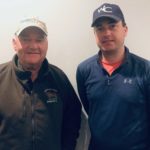
Nick Smith and his family farm near Epworth, Iowa, raising 400 acres of row crops, 120 acres of hay and 400 cow-calf pairs born spring and fall. The Smiths run a predominantly commercial cow-calf herd, have used cover crops for the past 15 years and have been no-till for 15 years.
Jack Smith, Ted Smith and Nick Smith of Epworth, Iowa, built a cover crop seeding method that allowed them to seed cereal rye as they combine: a combine air seeder. Seeding while they harvest enables an earlier seeding date for the cereal rye to capture additional growth from the cover crop. This session will cover the motivation behind building the machine, how they accomplished it and how seeding rye as they combine benefits their cover cropping practice.
Enhancing Farm Fertility Through Compost Production
Patrick McHugh
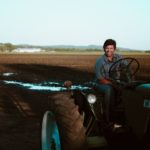 Patrick McHugh and his family operate McHugh Farms in Wisconsin where they farm over 900 acres, including sweet corn, pasture-raised pork and poultry, and specialty rye and corn for La Crosse Distilling. The McHughs care about food and nutrition and apply their passion to everything they do on the farm.
Patrick McHugh and his family operate McHugh Farms in Wisconsin where they farm over 900 acres, including sweet corn, pasture-raised pork and poultry, and specialty rye and corn for La Crosse Distilling. The McHughs care about food and nutrition and apply their passion to everything they do on the farm.
Compost can be an excellent way to build fertility on a farm. But establishing a robust compost system that satisfies nutrient needs is no easy task. Learn from Patrick McHugh about the composting system he uses on his family farm, which incorporates their spent grain returned from La Crosse Distilling. He’ll share their process of getting the compost system started, how to effectively manage feedstocks and the importance of testing to ensure a clean finished product.
Building a Meat Aggregator
Ray and Jess Schmidt
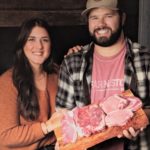 Ray Schmidt was raised on his family’s farm in Williamsburg, Iowa, and went on to study marketing, management and graphic design at Iowa State University, later earning his MBA. Jess Schmidt, originally from Clearwater, Florida, came to ISU without an ag background and earned a degree in management. Today, the couple lives in Ames, Iowa, where they co-own and operate Farm Story Meats, raise their baby, Theo, and connect with consumers from all over the country.
Ray Schmidt was raised on his family’s farm in Williamsburg, Iowa, and went on to study marketing, management and graphic design at Iowa State University, later earning his MBA. Jess Schmidt, originally from Clearwater, Florida, came to ISU without an ag background and earned a degree in management. Today, the couple lives in Ames, Iowa, where they co-own and operate Farm Story Meats, raise their baby, Theo, and connect with consumers from all over the country.
When the next generation returns to the farm, they often bring fresh ideas and bold ambitions. That was true for Ray. After finishing school, he came back with a vision: to make his family’s pork more accessible by selling directly to consumers. Seven years later, that vision has grown into Farm Story Meats, a thriving business he runs with his wife, Jess. Together, they not only market their own family’s pork, they also partner with farmers across Iowa to offer a wider range of high-quality meats. Come hear how they’ve grown the business and the lessons they’ve learned along the way.
Managing a Wool Enterprise Realistically
Courtney Gutschenritter
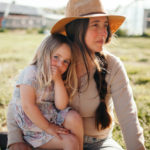 Courtney Gutschenritter, along with her husband, Michael, and three children, farm Three Brothers Farm in Oconomowoc, Wisconsin. On their 100 acres, they graze Shetland sheep for lamb, wool blankets, hats, rugs and sheepskins. They also produce pasture-raised, certified organic eggs under their label Prairie Gold Organics. Courtney and her family have planted over 150 burr oaks in their pastures and have established 28 acres of pollinator prairie on their farm.
Courtney Gutschenritter, along with her husband, Michael, and three children, farm Three Brothers Farm in Oconomowoc, Wisconsin. On their 100 acres, they graze Shetland sheep for lamb, wool blankets, hats, rugs and sheepskins. They also produce pasture-raised, certified organic eggs under their label Prairie Gold Organics. Courtney and her family have planted over 150 burr oaks in their pastures and have established 28 acres of pollinator prairie on their farm.
Every year sheep grow a new batch of wool, and with that comes the warmth of infinite potential. However, one must acknowledge the tempered reality of running a farm and business. Join Courtney as she shares the practicalities of pasture management, choosing wool products, processing, pricing and marketing. With intentional choices, consistency and coordination, it’s possible to have a profitable wool enterprise.
CANCELLED: Taking Responsibility: Interdependence on the Land
Phil Specht
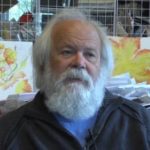
Phil Specht and his wife, Sharon Specht, have farmed for over 50 years, shifting from Holstein dairying to beef while dedicating 245 acres of their 285-acre farm to bird habitat with the Iowa Natural Heritage Foundation. A pioneer in managed grazing and embryo transfer, Phil’s herd contributed to bovine genome mapping and advances in Holstein genetics. Phil has served on numerous farm, dairy and conservation boards, including as chairman of the Clayton County Conservation Board. He now collaborates with Cornell’s Lab of Ornithology on research connecting grazing to bobolink nesting.
****This session has been cancelled.****
Join farmer, conservationist and poet Phil Specht as he shares how agriculture and biodiversity can thrive together. Using regenerative grazing on protected land, Phil emphasizes that farmers are part of the landscape. This session will explore habitat benefits for wildlife, reducing runoff, protecting water and moving beyond monoculture. Learn how the language around these topics can unite, not divide, and how partnerships with different agencies and nonprofits help landowners meet conservation goals and protect Iowa’s natural resources.
Lightning Talks Round 1
Virtual Fencing Collars To Manage AMP Grazing Cattle Across Separate Pastures
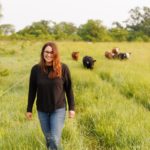 Laura Keniston owns and operates Night & Day Ranch near Cedar Rapids, Iowa. She rotationally grazes cattle and goats on marginal and organically managed, leased pastures. The 100% grass-fed beef is sold directly to local consumers. In June 2025, Laura’s cattle became the first in the U.S. to use Monil’s virtual fencing system.
Laura Keniston owns and operates Night & Day Ranch near Cedar Rapids, Iowa. She rotationally grazes cattle and goats on marginal and organically managed, leased pastures. The 100% grass-fed beef is sold directly to local consumers. In June 2025, Laura’s cattle became the first in the U.S. to use Monil’s virtual fencing system.
Common Mistakes in Grocery Pricing
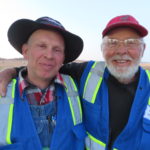 Jeff Hafner owns and operates Early Morning Harvest, a unique aquaponic, produce and grain farm located in Panora, Iowa. Jeff and his father, Earl, lead their team in growing corn, wheat, rye, oats and buckwheat that they stone-grind into flours, meals and cereals and distribute to stores across the Midwest.
Jeff Hafner owns and operates Early Morning Harvest, a unique aquaponic, produce and grain farm located in Panora, Iowa. Jeff and his father, Earl, lead their team in growing corn, wheat, rye, oats and buckwheat that they stone-grind into flours, meals and cereals and distribute to stores across the Midwest.
8 Things I Learned in 8 Minutes – Lessons From Farming
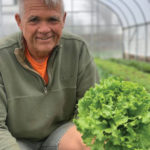 John Wesselius and his wife, Janna Wesselius, own and operate The Cornucopia, a 9-acre vegetable farm raising Certified Naturally Grown produce near Sioux Center, Iowa. Since 2005, the couple has marketed through a CSA and by selling produce at farmers markets in Falls Park, South Dakota, Sioux City, Iowa, and Sioux Center. They also raise pastured poultry and partner with a neighbor to sell pork from purebred Berkshire pigs.
John Wesselius and his wife, Janna Wesselius, own and operate The Cornucopia, a 9-acre vegetable farm raising Certified Naturally Grown produce near Sioux Center, Iowa. Since 2005, the couple has marketed through a CSA and by selling produce at farmers markets in Falls Park, South Dakota, Sioux City, Iowa, and Sioux Center. They also raise pastured poultry and partner with a neighbor to sell pork from purebred Berkshire pigs.
Give Your Ground a Sweater – Alternative to Tillage and Plastic Mulch
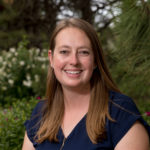 Kristine Lang is an assistant professor and extension consumer horticulture specialist at South Dakota State University in Brookings, South Dakota. She holds a doctorate from Iowa State and works with farmers and gardeners on high-tunnel management, cut flowers, cover crops and reduced tillage for vegetable production.
Kristine Lang is an assistant professor and extension consumer horticulture specialist at South Dakota State University in Brookings, South Dakota. She holds a doctorate from Iowa State and works with farmers and gardeners on high-tunnel management, cut flowers, cover crops and reduced tillage for vegetable production.
Comparative Trial Report: Fermented vs. Non-Fermented Feed in Meat Chickens
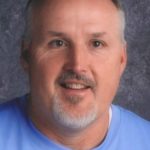 John Seiser and his wife, Laura, own and operate Treasure Acres Farm in Blairsburg, Iowa, a regenerative operation with berries, vegetables, bees and livestock. They focus on soil health, pollinators and sustainable practices, offer youth education and engage with PFI to improve and share results.
John Seiser and his wife, Laura, own and operate Treasure Acres Farm in Blairsburg, Iowa, a regenerative operation with berries, vegetables, bees and livestock. They focus on soil health, pollinators and sustainable practices, offer youth education and engage with PFI to improve and share results.
Animal Traction as a Practical Source of Power for the Small Farm
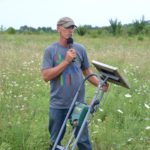 Russ Wischover owns 120 acres of permanent pasture in Taylor County, Iowa. He got his first work team of ponies when he was 12 years old, and has loved horses and ponies ever since. He left the land for 20 years to live life and try various industries. In 2001, he set up his permanent pasture and got back into the business of livestock, including cattle and ponies. He sold the last of his cattle in 2018, and today focuses primarily on ponies. He uses the 22 ponies he has today for farm work such as moving bales and overseeding corn, and participates in picking contests and plow days.
Russ Wischover owns 120 acres of permanent pasture in Taylor County, Iowa. He got his first work team of ponies when he was 12 years old, and has loved horses and ponies ever since. He left the land for 20 years to live life and try various industries. In 2001, he set up his permanent pasture and got back into the business of livestock, including cattle and ponies. He sold the last of his cattle in 2018, and today focuses primarily on ponies. He uses the 22 ponies he has today for farm work such as moving bales and overseeding corn, and participates in picking contests and plow days.
Saturday Session 4: 4-5 p.m.
Using Local Food at the Iowa Event Center
Makenzie Schurk and Jonathan Cook
 Makenzie Schurk is the catering sales manager at the Iowa Events Center. In that role, she works with incoming groups (including Practical Farmers) to understand their catering needs. For the PFI Annual Conference, this also includes purchasing from local farmers and producers in collaboration with PFI staff.
Makenzie Schurk is the catering sales manager at the Iowa Events Center. In that role, she works with incoming groups (including Practical Farmers) to understand their catering needs. For the PFI Annual Conference, this also includes purchasing from local farmers and producers in collaboration with PFI staff.
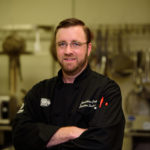 Jonathan Cook is the executive chef at the Iowa Events Center, where he is responsible for menu development, staff management and client relations. He believes food serves as a common denominator that connects us all, driving his commitment to excellence and his enduring passion for the culinary arts.
Jonathan Cook is the executive chef at the Iowa Events Center, where he is responsible for menu development, staff management and client relations. He believes food serves as a common denominator that connects us all, driving his commitment to excellence and his enduring passion for the culinary arts.
When the PFI conference moved to the Iowa Events Center, many attendees were nervous about the center’s willingness to use products grown and raised on local farms. Turns out, we found willing partners in the culinary and catering teams! Hear from chef Jonathan, and from Makenzie Schurk, on how the culinary and catering teams approach the menu, sourcing and execution for the PFI conference. They’ll also share what they’ve learned about working with farmers, and what role they think institutions like the Iowa Events Center can play – now and in the future – in supporting Iowa’s local food producers.
Field to Table: Connections Across Culinary Grain Value Chains
Patrick McHugh, Jeff Hafner, Amber Lambke and Sarah Elliott
 Patrick McHugh and his family operate McHugh Farms in Wisconsin where they farm over 900 acres, including sweet corn, pasture-raised pork and poultry, and specialty rye and corn for La Crosse Distilling. The McHughs care about food and nutrition and apply their passion to everything they do on the farm.
Patrick McHugh and his family operate McHugh Farms in Wisconsin where they farm over 900 acres, including sweet corn, pasture-raised pork and poultry, and specialty rye and corn for La Crosse Distilling. The McHughs care about food and nutrition and apply their passion to everything they do on the farm.
 Jeff Hafner owns and operates Early Morning Harvest, a unique aquaponic, produce and grain farm located in Panora, Iowa. Jeff and his father, Earl, lead their team in growing corn, wheat, rye, oats and buckwheat that they stone-grind into flours, meals and cereals and distribute to stores across the Midwest.
Jeff Hafner owns and operates Early Morning Harvest, a unique aquaponic, produce and grain farm located in Panora, Iowa. Jeff and his father, Earl, lead their team in growing corn, wheat, rye, oats and buckwheat that they stone-grind into flours, meals and cereals and distribute to stores across the Midwest.
Amber Lambke is cofounder and CEO of Maine Grains, Inc., a gristmill housed in a repurposed jailhouse that has spurred the revival of grain production in Maine. She is also the founding director of the Maine Grain Alliance, a nonprofit formed to preserve regional grain traditions from earth to table.
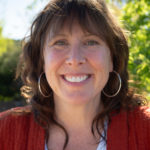 Sarah Elliott is the network engagement director for the Artisan Grain Collaborative. Facilitation and relationship-building skills are a through line in her career, as she has more than 15 years of experience leading cross-sectoral teams in strategic planning, consensus-building and the development of organizational and educational resources.
Sarah Elliott is the network engagement director for the Artisan Grain Collaborative. Facilitation and relationship-building skills are a through line in her career, as she has more than 15 years of experience leading cross-sectoral teams in strategic planning, consensus-building and the development of organizational and educational resources.
As demand rises across the country for locally sourced ingredients, farmers are discovering new opportunities to diversify and market their grains. Through the insightful facilitation of the Artisan Grain Collaborative, hear from panelists Amber, Jeff and Patrick as they each share their unique role in the grain chain and demonstrate the value of establishing partnerships to build a robust and sustainable local culinary grain economy.
Matchmaking: Landowners, Beekeepers and Honeybees
Julia McGuire
 Julia McGuire helps beekeepers get confident with basic skills and niche topics. Since inheriting her bees in 2011, Julia has kept bees in her backyard and at other sites. She has also created beelaws.org and the Phenology Calendar for Beekeepers; founded her city’s community garden; trained beekeepers in Jamaica and Honduras; and served on the boards of her regional bee club and the Iowa Farmers Union.
Julia McGuire helps beekeepers get confident with basic skills and niche topics. Since inheriting her bees in 2011, Julia has kept bees in her backyard and at other sites. She has also created beelaws.org and the Phenology Calendar for Beekeepers; founded her city’s community garden; trained beekeepers in Jamaica and Honduras; and served on the boards of her regional bee club and the Iowa Farmers Union.
It can take a particular set of factors for bees to thrive in a given place: an ideal food source, a suitable hive location and enthusiastic landowners. Come learn from Julia about what a bee is looking for, and what you should look for when placing honeybee hives. We’ll look at considerations for honeybees and their preferences. We’ll also discuss considerations for landowners interested in hosting an “out yard” for a beekeeper, and for beekeepers looking for arrangements that suit their needs.
Predator Problems Roundtable
Courtney Gutschenritter
 Courtney Gutschenritter, along with her husband Michael and three children, farm Three Brothers Farm in Oconomowoc, Wisconsin. On their 100 acres, they graze Shetland sheep for lamb, wool blankets, hats, rugs and sheepskins. They also produce pasture-raised, certified organic eggs under their label Prairie Gold Organics. Courtney and her family have planted over 150 burr oaks in their pastures and have established 28 acres of pollinator prairie on their farm.
Courtney Gutschenritter, along with her husband Michael and three children, farm Three Brothers Farm in Oconomowoc, Wisconsin. On their 100 acres, they graze Shetland sheep for lamb, wool blankets, hats, rugs and sheepskins. They also produce pasture-raised, certified organic eggs under their label Prairie Gold Organics. Courtney and her family have planted over 150 burr oaks in their pastures and have established 28 acres of pollinator prairie on their farm.
Whether it’s poultry being snatched or sheep falling prey, predation looms large in many farmers’ lists of worries. Between figuring out how to identify offending species, decoys, electric fencing, guardian animals and other solutions, there are many creative ways to address this complicated problem. Come connect with other farmers to share your struggles with predators – and your successes in preventing the problem.
Reimagining the Family Farm With Mushrooms
Tanner Faaborg
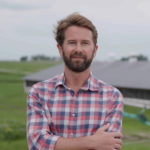 Tanner Faaborg grew up on his family’s hog farm in central Iowa. When he returned to the farm, he set out converting the family’s hog confinements into spaces to grow mushrooms and turned the farm into a place to cultivate mushrooms and innovation.
Tanner Faaborg grew up on his family’s hog farm in central Iowa. When he returned to the farm, he set out converting the family’s hog confinements into spaces to grow mushrooms and turned the farm into a place to cultivate mushrooms and innovation.
Join Tanner Faaborg, owner and operator of 1100 Farm, as he recounts his farming journey transforming his family’s hog confinement buildings into an innovative specialty-mushroom operation. Tanner will share tips and tricks about working and communicating with family, reimaging the conventional family farm to make space for the next generation and building a business model that suits all stakeholders involved.
Entrepreneurship, Heritage and Feeding the Community
Darius Kangai Nupolu
 Darius Kangai Nupolu, owner and operator of Nupolu’s Emerging Farms LLC in Cedar Rapids, Iowa, is dedicated to sustainable vegetable production, empowering his community and creating farming opportunities for future generations. He bridges his Liberian heritage with his adopted home in Iowa.
Darius Kangai Nupolu, owner and operator of Nupolu’s Emerging Farms LLC in Cedar Rapids, Iowa, is dedicated to sustainable vegetable production, empowering his community and creating farming opportunities for future generations. He bridges his Liberian heritage with his adopted home in Iowa.
Darius Kangai Nupolu, owner and operator of Nupolu’s Emerging Farms LLC, grows culturally relevant crops including sweet potato leaves, fever leaves, bitterball, jute leaves, African white eggplant, hot peppers and okra for his family and his customer base. Join Darius in this session to learn how he grows his crops with organic practices and the agricultural principles he learned when he earned his degree from Liberia University.
Healing the Land: Creating Resilience Through Native Habitat Restoration
Angela Smith
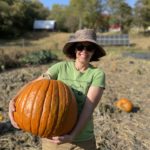 Angela Smith owns and operates Middle Fork Farm in Oronoco, Minnesota, with her family. Farming is her second career after two decades in academia, most recently at the Johns Hopkins Center for a Livable Future, where she worked on sustainable agriculture, environmental stewardship, social justice and food security.
Angela Smith owns and operates Middle Fork Farm in Oronoco, Minnesota, with her family. Farming is her second career after two decades in academia, most recently at the Johns Hopkins Center for a Livable Future, where she worked on sustainable agriculture, environmental stewardship, social justice and food security.
When Angela Smith purchased Middle Fork Farm in 2013, the land was degraded by overgrazing and invasive species. Her family has worked to restore its health and biodiversity by planting native trees, shrubs, prairie and establishing a native plant nursery. Through partnerships with agencies and nonprofits, as well as self-funding, they have taken on the removal of red cedar, added cover crops and improved soil and water quality on their farm – all while creating critical habitat. Join Angela as she shares her journey and lessons learned in the ongoing march towards building a more resilient farm.
Lightning Talks Round 2
Pressing Hickory Nuts for Oil
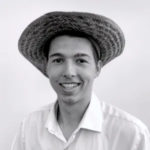 Levi Geyer runs Fancy Twig Farm in Oxford, Iowa, a small operation focused on hickory oil production and development. In 2024 he collected over 1,000 gallons of wild yellowbud hickory nuts, which were pressed into 76 gallons of oil. In the future, he hopes to manage a farm that incorporates Chinese chestnuts, yellowbud hickories, hair sheep and fodder trees. This session is part of the SARE Farmer’s Forum.
Levi Geyer runs Fancy Twig Farm in Oxford, Iowa, a small operation focused on hickory oil production and development. In 2024 he collected over 1,000 gallons of wild yellowbud hickory nuts, which were pressed into 76 gallons of oil. In the future, he hopes to manage a farm that incorporates Chinese chestnuts, yellowbud hickories, hair sheep and fodder trees. This session is part of the SARE Farmer’s Forum.
Insights From Irish Field Tours
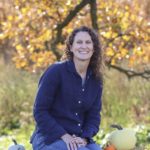 Rebekah Ahrens runs Twisted Oaks near Milan, Illinois, with her husband, Mark, and two teenage children. They raise sheep, goats and laying hens while restoring oak savanna pasture. Mark and Rebekah moved back to Rebekah’s family land having grown up away from the farm and establishing information technology careers.
Rebekah Ahrens runs Twisted Oaks near Milan, Illinois, with her husband, Mark, and two teenage children. They raise sheep, goats and laying hens while restoring oak savanna pasture. Mark and Rebekah moved back to Rebekah’s family land having grown up away from the farm and establishing information technology careers.
Connecting Rural Men in Iowa Through Men’s Sheds
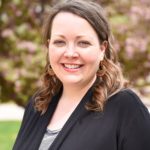 Melinda Heinz is an assistant professor in the Department of Family, Aging & Counseling at the University of Northern Iowa. She teaches courses in gerontology. Her research focuses on purpose and meaning in life in older adulthood. Much of her work has focused on exploring the benefits of men’s sheds in the U.S. and other countries. In 2024, she started the first Men’s Shed in Iowa, Cedar Valley Men’s Shed, located in Cedar Falls.
Melinda Heinz is an assistant professor in the Department of Family, Aging & Counseling at the University of Northern Iowa. She teaches courses in gerontology. Her research focuses on purpose and meaning in life in older adulthood. Much of her work has focused on exploring the benefits of men’s sheds in the U.S. and other countries. In 2024, she started the first Men’s Shed in Iowa, Cedar Valley Men’s Shed, located in Cedar Falls.
Tips for Getting Started in Beekeeping
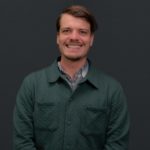 Joe Klingelhutz became a farmland access navigator in fall 2022. He lives in Iowa City, Iowa, where he is involved in farming vegetables, honeybees, perennials and chickens. He runs his own independent beekeeping operation and has worked for several other farms.
Joe Klingelhutz became a farmland access navigator in fall 2022. He lives in Iowa City, Iowa, where he is involved in farming vegetables, honeybees, perennials and chickens. He runs his own independent beekeeping operation and has worked for several other farms.
Tick Talk: Understanding and Preventing Tick-Borne Diseases
 Shaun Cross is an assistant professor in environmental, agricultural and occupational health at University of Nebraska Medical Center, and a member of Central States Center for Agricultural Safety and Health. His work focuses on tick risks, diseases and their impact on farmers. His group also runs Nebraska’s free tick testing program.
Shaun Cross is an assistant professor in environmental, agricultural and occupational health at University of Nebraska Medical Center, and a member of Central States Center for Agricultural Safety and Health. His work focuses on tick risks, diseases and their impact on farmers. His group also runs Nebraska’s free tick testing program.
The Kids Are Alright: Lessons From a Youth Employment Program
 Carmen Black, with her sister, Maja, owns and operates Sundog Farm and Local Harvest CSA near Solon, Iowa. On the diversified operation they raise vegetables for 200 families and graze a small flock of sheep. They also conduct on-farm research through the Cooperators’ Program. Carmen is PFI’s current board president.
Carmen Black, with her sister, Maja, owns and operates Sundog Farm and Local Harvest CSA near Solon, Iowa. On the diversified operation they raise vegetables for 200 families and graze a small flock of sheep. They also conduct on-farm research through the Cooperators’ Program. Carmen is PFI’s current board president.
Acknowledgements
Thank you to the organizations, business and agencies who provided support for the PFI Annual Conference:
- The Builders Initiative
- Cargill
- The Cedar Tree Foundation
- Hearst Foundation
- Lifeline Foods
- McKnight Foundation
- PepsiCo
- Roger Ross Gipple on behalf of BeWildReWild and BIG RIVER CONNECTIVITY. Bewildrewild.org
- Unilever
- Walmart
- Walmart Foundation
- Walton Family Foundation
- This project is supported by The Foundation for Food & Agriculture Research. Any reference to specific products or technology does not constitute or imply an endorsement by FFAR for those products or technology.
This project is made possible through a grant from the National Fish and Wildlife Foundation and the U.S. Department of Agriculture, under agreement number 2004.22.075401. - This project is supported in part by the Conservation Innovation Grants through the Natural Resources Conservation Service no. NR223A750013G028 through a subaward with Pheasants Forever.
- Funding for 2026 PFI Annual Conference was made possible by a grant/cooperative agreement from the U.S. Department of Agriculture (USDA) Agricultural Marketing Service. Its contents are solely the responsibility of the authors and do not necessarily represent the official views of the USDA.
- This project is supported in part by The Nature Conservancy
- This project is made possible through a grant from the National Fish and Wildlife Foundation, with support from NRCS, Cargill, Inc, and Nestle USA. Award number 2004.24.081651.
- This work is supported by Agriculture and Food Research Initiative Competitive Grants Program Sustainable Agricultural Systems (SAS) grant no. F9000315202081 from the USDA National Institute of Food and Agriculture.
- This material is based upon work supported by the U.S. Department of Agriculture, under agreement number NR233A750004G053.
- The North Central Region-Sustainable Agriculture Research and Education (NCR-SARE) Farmers Forum is a traveling annual event giving farmers, ranchers, researchers and others the chance to share information about sustainable agriculture practices with a national audience. These presentations focus on research, demonstration, and education projects that promote profitable practices that are good for the environment and community. The projects highlighted in these presentations and the Farmers Forum are funded by grants from NCR-SARE, a USDA funded program that supports and promotes sustainable farming and ranching by offering competitive grants and educational opportunities.
The views and conclusions contained in this document are those of the authors and should not be interpreted as representing the opinions or policies of the U.S. Government or the National Fish and Wildlife Foundation and its funding sources. Mention of trade names or commercial products does not constitute their endorsement by the U.S. Government, or the National Fish and Wildlife Foundation or its funding sources.

